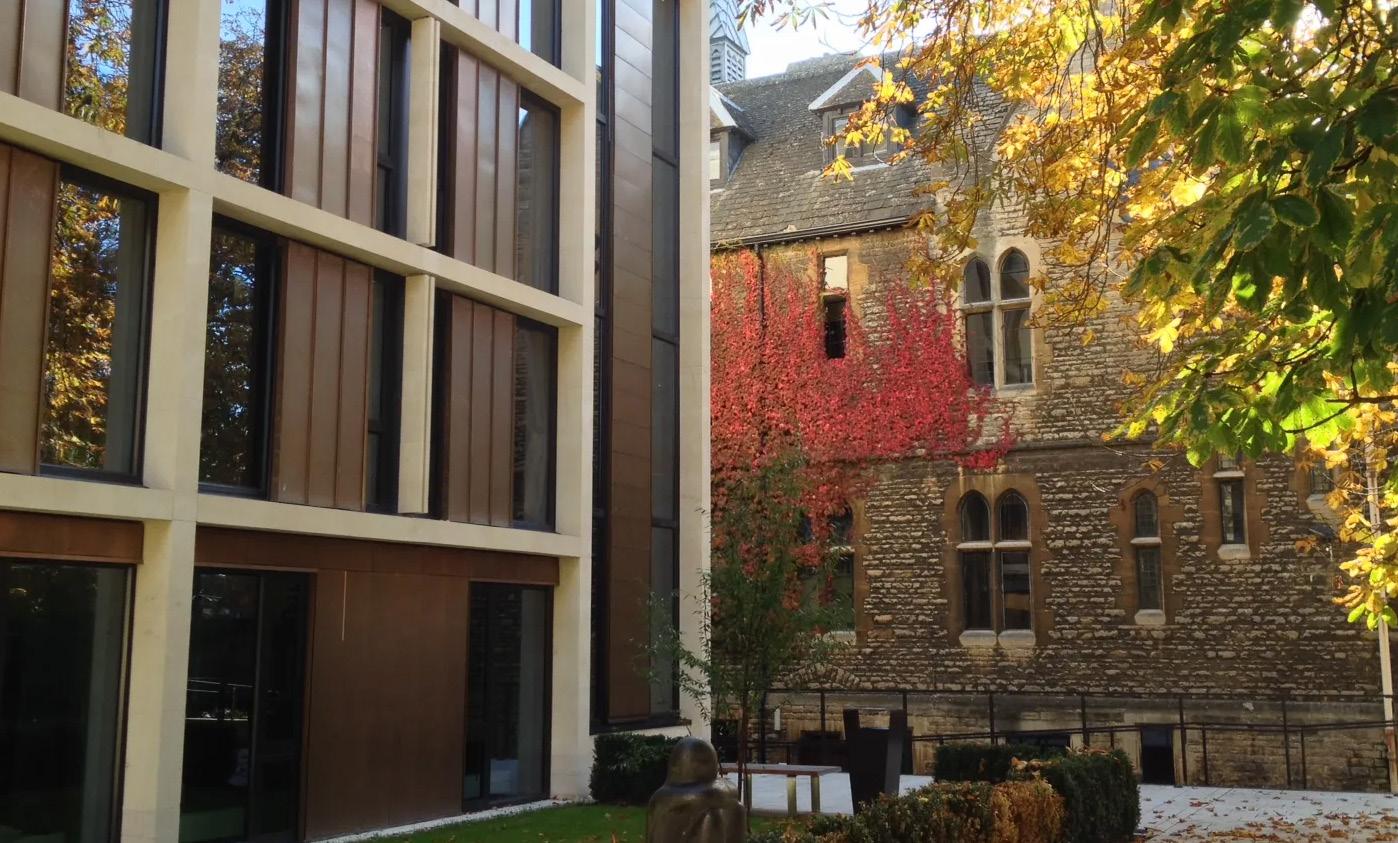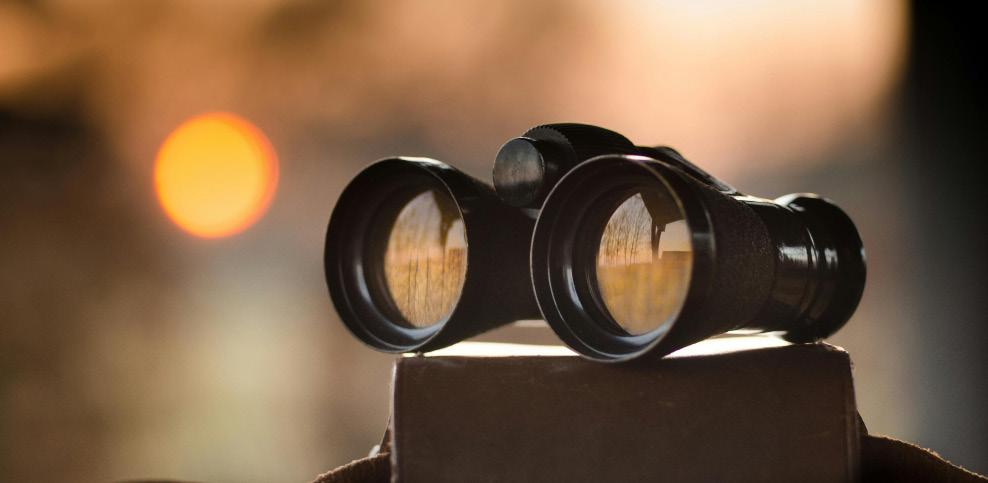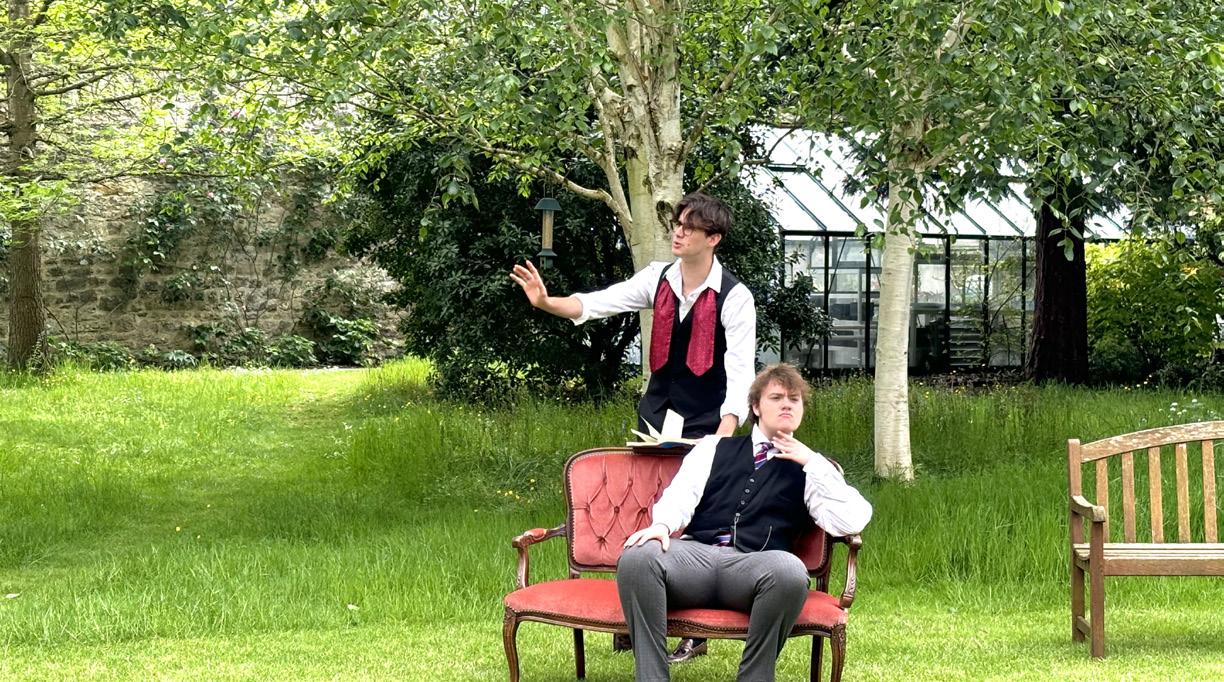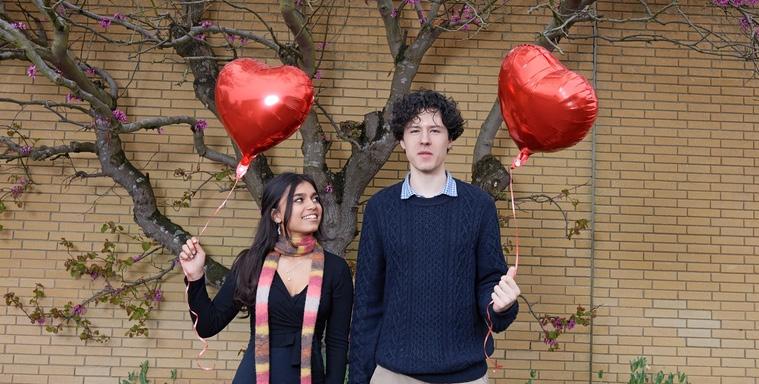O XFORD S TUDENT
Eco-corner:


Eco-corner:

On 6 May, pro-Palestinian demonstrators occupied the lawn in front of the Pitt Rivers and Natural History Museum Complex, marking the beginning of Oxford’s Gaza Solidarity Encampment to protest the University’s financial ties to the conflicts in Gaza.
Oxford Action For Palestine (OA4P) urges the University to divest from Israel, disclose all finances, divest from “Israeli–genocide apartheid and occupation”, overhaul investment policy, stop banking with Barclays, and commit to rebuilding the educational sector in Gaza.
The past two weeks have seen an escalation of activism in Oxford, from protest against Speaker Emerita Nancy Pelosi’s visit to the Oxford Union,
among other demonstrations across a number of locations in Oxford.
“ There can be no business as usual... we will escalate until our demands are met — An OA4P spokesperson
Unlike the violent confrontations overseen by US college administrations that have shaken American campuses, the University has taken a more permissive approach, reiterating the importance of rights to freedom of expression and peaceful protests yet without directly responding to the encampment’s demands.
As the impasse with the University plays out, OA4P has carried out a number of demonstrations, including rallies, and the die-in during graduation ceremonies. Dismayed by the University’s lack of response, the group has expanded encampment to the Radcliffe Camera, hoping to push the Univerity to negotiate. During this time, Oxford has witnessed many pro-Palestinian protesters building a community of solidarity and hope around their support for Gaza.
Open letters and statements from students and academics have also raised concerns about reported accelerating antisemitism around Oxford.
The Oxford Student has followed the encampment on the ground and compiled a timeline the latest actions.
Continued on page 4
Town and Gown 2024 Running with purpose
Oxford University has dropped plans to prescreen candidates by an internal committee and made several changes to the election rules of the chancellorship.
The new version makes clear that the committee will put forward all candidates for election unless the candidates are a student, an employee of the University, and a serving member or a declared candidate for election to, an elected legislature.
The original version of the rules stated that a chancellor’s
election committee, made up of senior university staff, can determine which candidates are eligible to progress according to principles of equality and diversity.
The committee will no longer oversee the election process and will play no substantive role in the selection of a Chancellor. It will be responsible for “establishing the election timeline,” “advertising the role,” and “establishing the information to be provided by candidates.”
The University deleted a rule that the Chancellor’s Election Committee would have “due...
Continued on page 3
It was my great pleasure this week to meet with the Vice President of Liberation and Equality at the Student Union, Kennedy Aliu. As well as this very important role in the SU, Kennedy is a master’s student in Refugee and Forced Migration Studies at Green Templeton College. I sat down with him to ask about his role, equality at Oxford, and the recent SU budget cuts.
Lucy Pollock: “First off, can you outline what exactly your role as VP of Liberation and Equality means? “
Kennedy Aliu: I am in charge of everything that has to do with Equality, Diversity and Inclusion (EDI). That means I look at policies which the university has implemented and look at who is included or excluded by these policies: looking out for the needs of students of colour and disabled students, ... Continued on page 12
The SU VP Liberation and Equality. Credit: Kennedy Aliu
 A protester waving a Palestinian flag at the RadCam encampment. Credit: Madeleine Jane
A protester waving a Palestinian flag at the RadCam encampment. Credit: Madeleine Jane

Scan this code to receive weekly top stories and more!

Scan this code to listen to our fortnightly podcast on Spotify!
Features
The timeless appeal of college rowing
16

Identity LGBTQIA+ education in schools

23

This week at OxStu, the encampment was again a big part of the news cycle. With a second encampment being set up in front of the RadCam, we decided to dedicate a double page to what happened since our last print edition. The effort the news team has put to ensure coverage has been very impressive.
Thanks to Valida for organising news coverage even amid a triple essay crisis, and for laboriously writing up all the articles and recaps. Thank you to Cameron for covering virtually every protest at the encampment, and for taking fantastic photos of everything happening. And of course thank you to Daisy for all her advice, and

Ican’t believe we’re already more than halfway through Trinity. Amidst preparing for my dissertation, picnics, and soaking up the sunshine (when I can) – time has flown by. I hope Trini-
Editorial Board
Gaspard Rouffin and Martin
Alfonsin Larsen (Editors-inChief)
Sami Jalil and Keng Yu Lai (Associate Editors)
Daisy Outram and Tara Earley (Directors of Strategy)
Strategy
Charlie Bowden (Welfare)
Sharon Chau, Amelia Gibbins, Elsie Haldane, Matt Holland
News
Valida Pau
Anandita Abraham, Tim Carroll, Audrey Davidson-Houston, Olly
to everyone else who makes the OxStu news team what it is. Writing news is always a compromise between thoroughness, speed, and accuracy. We always try to get the best information out as soon as possible for the student body (let’s be real, we just want to get it out before Cherwell) but sometimes slip ups happen, even when we make every effort to avoid these and to always relay accurate and representative information.
That’s what I really enjoy about OxStu, and what the joy of being a student journalist is: the excitement of seeing news and history happen before your eyes, and having the privilege to report on it. Even as I am slightly going insane, having just finished my 18th hour on InDesign in the past two days (only 5 to go!) and having listened to the 14 hour ‘slayin vibin’ playlist twice already, OxStu is still the highlight of my Trinity term so far.
ty has been living up to your expectations. I personally am going to make the most of what may be my last term of fun before final year – here’s to more reading in random parks, breakfast dates, game nights and impromptu chats. I’m also absolutely stoked for the tortoise race this Sunday (go Truffle!).
Since this is my last editorial, I just wanted to take this opportunity to say thank you to Gaspard and Martin, who have worked tirelessly all term – the paper has
DeHerrera, Ruby Hurst, Gabriella Kchozyan, Linda Liu, Rebecca Whalley
Investigations
Daisy Outram and Ruby Hurst (Senior and Junior Heads)
Anandita Abraham, Yunzhang Liang
Comment
Johannes Riese
Lindsay Berat, Amelia Bryan, Yusuf Kungdol, Yunzhang Liang
Zaid Magdub (columnist)
Profile
Tallulah Hawley
Audrey Davidson-Houston, Purav Menon, Lucy Pollock
Contact us at editor@oxfordstudent.com

Historic things have been happening all over the place this week. Our very own Director of Strategy Daisy became South East Regional Officer at the Student Publication Association; Rishi Sunak called a general election for 4 July. OxStu and Cherwell will be having a joint social this Friday; the encampment migrated to the RadCam after the University did not enter negotiations with their representatives. If this last week has made me think about anything, it’s that being at this University assigns a significance to actions that wouldn’t otherwise have them. Something controversial happens at your debate society? The Telegraph will
had an incredible redesign as have our social media. Your passion for the paper and journalism is incredibly inspiring. Thank you for all your guidance and the chats. And to Sami, I’m really glad I was Associate Editor with you, thank you for the lovely talks and for all the advice. They’ve done a fabulous job on the newsletter, and I hope you’ve enjoyed reading it as much as I have. And to all the Deputy Editors and Section Editors, thank you for all your hard
Features
Amelia Gibbins
Caitlin Clarke, Linda Liu, Ananya Navale, Lucy Pollock, Angela Yu
Enrique Normand Velarde, Eva Price (columnists)
Culture
Georgie Allan
Sophie Harrison, Isra Khan, Yunzhang Liang, Anton March, Nikhil Singh, Rebecca Whalley, Angela Yu
Elliot Francolla, Johannah Mathew
Identity
Elsie Haldane
Caitlin Clarke, Georgia Ferris, Sameeha Qureshi
Georgie Allan, Sharon Chau (columnists)
want to know about it. Protesters move onto the lawn of the most significant building in the town? It’s the subject of international news and scrutiny. In many ways, we have influence in shaping narratives that few other late-teen and twenty-something-year olds have.
But what do we choose to do with that influence? I think I can proudly say that our output this week reflects what students have been doing with it. Among many articles, we have a special double-page spread dedicated to the encampment and the responses to it. It has also been analysed extensively in various sections. And we of course have the entirely non-satirical OxYou BNOC list that should definitely be taken seriously. I couldn’t be prouder of the shift that the team have pulled, and I hope you enjoy reading this edition as much as we enjoyed making it.
Martin Alfonsin Larsen St Catherine’s Collegework, the paper wouldn’t be the same without all of you. I hope you’ve found your time here as fun and meaningful as I have! A special shoutout goes to Liberty, thank you for looking out for me in this incredibly busy period – your support means the world.
All the best to everyone! I can’t wait to see what next term brings!
Keng Yu Lai Regent’s Park College
Science
Sabine Zednik-Hammonds
Amelia Bryan, Ava Chan, Krishh Chaturvedi, Gabriella Kchozyan, Sameeha Qureshi
OxYou
Olly DeHerrera
Ella Goodwin, Florence Purcell
Sport
Haochen Wang
Purav Menon, Johannes Riese
Creative
Rhea Brar, Elliot Francolla, Caroline Kuba, Olivia White, Cameron Samuel Keys, Ananya Navale, Elyse Airey, Yashas Ramakrishnan

The Radcliffe Camera. Credit: Ananya Navale
An open letter to the Vice-Chancellor, Deans, and Proctors of the University of Oxford describes an “escalation of antisemitic and anti-Israeli incidents in the university since the 7th of October.”
The document was written by both “Jewish and non-Jewish”, and “Israeli and non-Israeli” students, staff, academics, and alumni who are “deeply alarmed” by the situation. They remained anonymous to “avoid victimisation.”
The letter acknowledges the Vice-Chancellor’s statement condemning “antisemitism, Islamophobia, anti-Palestinian discrimination”, but calls the University to take action to create a “safe and protected environment”.
Appended to the open letter is a list of 75 antisemitic incidents, which affected Jewish and Israeli students, tutorial fellows, professors, and University staff. Incidents vary in nature, from isolated antisemitic comments by staff and students to the use of antisemitic symbols and language on social media, including JCR, MCR, and University platforms.
The letter describes a “lack
of aid and sympathy” around the October 7th attack that “only a handful” of members of the University have been personally contacted by University welfare services. Jewish members were met with antisemitic comments when seeking support.
It further describes a “hostile environment” for Israeli students and academics, and “harassment incidents, directed at Jewish and Israeli university members”. It also finds the “conspiratorial narratives” in University forums “alarming”, and adds that the University is “failing” to act on harassment and discrimination complaints, with most of them being reportedly dismissed.
“ Antisemitism has been allowed to fester and grow without reproach.”
— A Jewish student
The Gaza Solidarity Encampment, which was condemned by the Oxford Israel Society, held an antisemitism training session on 8th May.
An Oxford University spokesperson commented:
Valida Pau
Continued from page 1 ...regard to the principles of equality and diversity” when deciding who should go forward to a vote of all graduates.
The University told The Oxford Student that it will still comply with the equality and diversity legislations and will not discriminate against any candidate.
“The University is unequivocal in its position that there is no place for antisemitism, Islamophobia, or unlawful discrimination of any kind directed towards any faith, race, nationality or ethnic group at the University of Oxford. All complaints related to harassment or discrimination of any kind are taken seriously, and formal complaints are always investigated if they are considered to have taken place within the University context.”
An anonymous Jewish student commented: “Antisemitism has consistently been justified and tolerated during legitimate criticisms of Israel’s actions.”
“Regarding the encampment, I was initially fearful, but since passing by a few times I think it is very peaceful […] I think it is a good, non-violent, outlet for students to express their support of the Palestinian people and feel as if they are making a real difference.”
Another student said: “As a Jewish student who has experienced a noticeable upsurge in antisemitic rhetoric since October, this report is sobering. It puts my experiences into a clear wider context; one in which antisemitism has been allowed to fester and grow without reproach.”
The Chancellor also cannot be disqualified or subject to disqualification by the Charity Commission and must be a “fit and proper person” as determined by guidance published by His Majesty’s Revenue & Customs.
“ The election committee will have no role in the vetting or selection of any nominations for Chancellor.
Following the current chancellor, Lord Christopher Patten’s announcement of his plan to retire in February, the University announced a new nomination process in March which requires potential candidates to receive
approval from a panel of selected University representatives.
In previous elections, any individual could run for election, as long as they were nominated by at least 50 members of the Convocation.
This comes after senior government officials criticised the University for staging a “woke” attempt to “stitch up” the process in order to prevent another white male politician from assuming the role of chancellorship.
These comments include Prime Minister Rishi Sunak, a Lincoln College PPE graduate warning that this new electoral process was “divisive,” and the former Secretary of State, Neil O’Brien stating: “The university seems intent on imposing an eastern [European] bloc-style ‘managed democracy’.
A University spokesperson stated that the rule change is a clarification of the role of the election committee.
“Through the proposed amendment to the regulations, the University Council’s intent is to remove any ambiguity and reinforce the intent of the original regulation that the election committee will have no role in the vetting or selection of any nominations for Chancellor. Our requirement to comply with the Public Sector Equality Duty remains unchanged.”

Continued from page 1
Oxford Israel Society and Jewish Students For Justice release statements addressing pro-Palestine encampment.
Oxford Israel Society condemned OA4P for “[failing] to mention Hamas, the source and cause of this war”, and called on the University of Oxford to reject all the demands and address antisemitism swiftly and sharply. The Society describes itself as “a Zionist organisation, defined as desiring the maintenance of the sovereign democratic Jewish State of Israel.”
Jewish Students for Justice (JSJ) issued a statement in solidarity with OA4P saying they “fully support the encampment’s struggle” and “call for the University to accept their demands in full.”
On Saturday evening, six men disrupted a vigil at the protestors at the encampment. The men directed abuse at the occupants and attempted to pull
down posters around the camp. Video of the men has been posted on social media shouting “Israel we love you” and calling the protestors on the encampment “Terrorists” and “Terrorist Sympathisers.”
OA4P posted a statement on their Instagram page following the incident and said the six men accosted the protestors with “xenophobic and transphobic slurs, among a litany of other vitriolic insults.”
“ In a shallow act of desperation, they’ve placed us in danger to distract from the fact that they are aiding and abetting Israel’s genocidal assault on Gaza.
OA4P accredited the incident to Prime Minister Sunak, University administrators, and the


media who had been “weaponising antisemitism to demonise campus protestors.”
The University issued a response today to the recently established pro-Palestinian encampment, in an email sent to all students and staff from Vice-Chancellor Irene Tracey. The Vice-Chancellor’s email affirmed the right to protest and freedom of speech but did not officially commit or comment on several demands made by the encampment.
The Vice-Chancellor said while she was “grateful that protests have been largely peaceful”, the University had heard directly from University members that “they have been feeling fearful or uncomfortable as a result” of them.
The statement did not include plans to look into divestment from Israeli companies and arms companies, a key demand from the pro-Palestine encampment protesters.
The University said that it “owns units of the Oxford Endowment Fund (OEF) and does not own shares in companies directly.” It stated that it abides
by ESG guidelines and all legal regulations, and complies with a “clear policy on investing in arms.”
On banking with Barclays, the University said it uses their
“ The conflict in the Middle East is causing unimaginable suffering. From the conversations I have had with many of you, I also know that this is a challenging time for our community.
— Vice-Chancellor Irene Tracey
service for its “large, complex financial needs” and it engages with the bank regularly on issues such as “net-zero, biodiversity” and the “conflict in Gaza”.
In its role as a University of Sanctuary status, the University reaffirmed its commitment to
“being a place of welcome for people who have been forcibly displaced.”
The University also stated it was “open” to publishing information on its finances.
The University highlighted their commitment to fellowships with the Council for At Risk Academics (CARA) to support at-risk Palestinian academics in applying to Oxford, and “in the defence of academic and university freedoms worldwide.”
On Thursday at 6 pm, OA4P held an emergency rally followed by a press conference in front of the Clarendon Building, which houses the offices of the Proctors and the Vice-Chancellor.
In a statement published on Tuesday, OA4P said they were “severely disappointed” that the University did not address their demands “substantially” and failed to “indicate any willingness to pursue further discussion.”
One OA4P representative stated that student funds should not play a role in “bankrolling genocide”.
Hundreds of protesters rallied outside the Clarendon Building and chanted slogans including “from the river to the sea,” “free Palestine”, “Oxford all through history, committed to complicity,” and “disclose, divest, we will not stop, we will not rest.”
At the protest, a representative for the group said that they had prepared a team of negotiators to discuss their demands with University representatives.
Oxford University junior common rooms (JCRs) have passed motions expressing solidarity with the recently established pro-Palestine encampment, reiterating the demands of OA4P to their respective colleges. Balliol College, Corpus Christi College, Jesus College, St Anne’s College, St Hilda’s College, Somerville College, University College and Wadham College Student Union have all passed JCR motions. Students and alumni of Lady Margaret Hall have signed an open letter, expressing their “firm support for those of the encampment outside the Pitt Rivers Museum.” Hertford College also released a public statement in solidarity.
An OA4P representative, during the Clarendon building rally the previous day, praised the “unprecedented coalition” of over 50 common rooms across 33 colleges that have filed for motions of the statement of Solidarity.
A group of 50 students in blood-stain clothing laid down at the staircase near the East entrance to the Sheldonian Theatre, in an attempt to disrupt three graduation ceremonies today.
“ There can be no business as usual. The University must not be allowed to forget this, and we will escalate to disrupt its functioning until they join us at the negotiating table and until our demands are met — An OA4P representative
A representative of OA4P told The Oxford Student that they are disrupting the graduation ceremonies because the University has stayed silent to their demands, and that they aim to disrupt the graduations “peacefully” and “silently”. The die-in aims to draw attention to the fact that there is no graduating class in Gaza in 2024, as inscribed on placards around protesters.
A worker who appeared to be a University library employee kicked a protester with his foot in an attempt to move him out of the main accessible pathway, and allegedly said to tourists: “Feel free to kick them out the way.” OA4P also alleged that members of the public stepped on protesters’ hands.
“There can be no business as usual. The University must not be allowed to forget this, and we will escalate to disrupt its functioning until they join us at the negotiating table and until our demands are met,” said OA4P in a statement.
In an escalation of events, protesters set up a second pro-Palestinian encampment on the lawn outside the Radcliffe Camera. OA4P called the Radcliffe Camera the “Liberated Zone #2” and stated that they will not leave until the University enters negotiations with them over key demands. The Radcliffe Camera remains open, but access is only through the Gladstone Link in the Old Bodleian Library. The rally was loud enough to cause a disruption in the library, with chants being loud enough to be heard, according to students inside the library.
Later in the day, a group of more than 250 protesters rallied around the Radcliffe Camera. A representative of OA4P started the rally by saying that “this library is full of


except negotiating with us,” so “we are going to be heard.”
Protesters also mockingly addressed the Vice-Chancellor, saying “There’s an elephant in the room and she’s called Irene”.
“ I’m broadly supportive of their cause, but I don’t think they should be doing this in such a public area.
— A tourist taking photos
A university spokesperson told The Oxford Student: “We are aware of the ongoing demonstration by members of our University community. We respect our students and staff members right to freedom of expression in the form of peaceful protests. We ask everyone who is taking part to do so with respect, courtesy and empathy.”
A tourist trying to take photos in front of the Radcliffe Camera said: “I’m broadly supportive of their cause, but I don’t think they should be doing this in such a public area, it’s very disturbing for everyone”.
A postgraduate student at
Radcliffe Camera said: “The university needs to act and stop the protests. This is a disgrace, this is condemnable, and this is dangerous. The library must be open. Students are being denied the right to study, and this is a denial of basic rights.”
Recent actions from across the UK
Pro-Palestine encampments also broke out across campus in the United Kingdom.
On May 17th, the University of Cambridge agreed to start negotiations with Cambridge for Palestine (C4P) representatives. This comes after protesters expanded encampments at Senate House, Cambridge’s central administration building after Cambridge first failed to meet C4P’s deadline to open negotiations. The divestment negotiation will reportedly begin the following week, according to Varsity.
On May 8th, Trinity College Dublin pledged to cut ties with Israeli companies five days after students started encampment. Trinity specifically stated that it would “endeavour” to divest from all firms with investments in “other Israeli companies” alongside the ones that have activities in occupied territories.

On 10 May, students witnessed a dazzling colour-show as the Northern Lights lit up the sky over Oxford.
The Northern Lights are rarely visible in the UK outside of Scotland but could be seen as far as the South Coast last night. The light show was visible over the whole of England, at their brightest between 1-2am.
By using the long-exposure feature on their phone cameras, many students could capture vivid photos of the sky, streaked with hues of greens, purples, and blues.
“I was outside, and everyone was going crazy, dancing and all!” said Tom, an MSc Maths student at Wolfson.”
For finalists, the appearance of the lights during the preparation for Finals had a special salience. “It reminds me there’s a bigger picture to everything” said Daneille, a Worcester English finalist.
Credit: Valida PauFootballer Leah Williamson addressed the Oxford Union on 16 May discussing her career and the progress in women’s football. Williamson is the captain of England women’s national team, known as the Lionesses, alongside playing for Women’s Super League club Arsenal. She plays in central defence or the midfield.
England’s Lionesses gained significant recognition winning Euro 2022, which was the country’s first major trophy since the men’s side won the World Cup in 1966. As the team’s captain of that squad, Williamson said seeing the impact of the win on the next generation of women in football gave her “goosebumps”.
In her address, Williamson first spoke of the “rapid and monumental change” seen in women’s football since the 2022 triumph. She explained this extends beyond statistics such as the increase in registered female football teams,
but how the Lionesses “earned the respect of the nation”. The captain emphasised how playing a male-dominated sport was both a “gift” and a “burden”, and the importance of prioritising being able to separate her own identity outside of sport with the help of her “support system”.
“ Winning the Euro 2022 is a feeling I can hold onto forever.
Interviewed by Union Librarian Isabelle Horrocks-Taylor, Leah Williamson described the Euro win as a feeling she would “hold onto forever”.
However, she called the victory a “relief” given how the players put “so much pressure on [themselves]”.
Looking forward to UEFA Women’s Euro 2025 with the ongoing qualifiers, Williamson warned of the “real danger” of complacency after pre-
vious success, but at the same time feeling “very excited” at “what the group has to offer”. Williamson missed the 2023 Women’s World Cup due to an anterior cruciate ligament (ACL) injury, a knee damage regarded as one of the worst injuries for footballers.
Horrocks-Taylor raised the new ACL research conducted with WSL clubs to understand the common issue. Despite expressing how she “will never see the benefits of that”, she hoped its work would help the “future of women’s football” to protect the next generation.
Speaking of young talent, the Arsenal centre-back discussed academy player Katie Reid’s recent debut. Joking that she now has “the job of keeping Katie at bay” for the future, she explained how improvements in the women’s game should provide younger players a “headstart on the rest of us”.
Williamson answered questions on the Lionesses’ solidarity with Spain’s Jenni Hermoso following the Luis Rubiales World Cup kiss scan-
dal. She explained that “[until] the world changes, there will always be problems,” as sexism and misogyny in football “reflect those issues in society”.
On advocacy for women and
“ Until the world changes, there will always be problems of sexism and misogyny in football.
girls in sport, the Lionesses’ captain explained their work after the Euros as seeking a world “big enough… for everyone to do what they want to do”. The team was said to “always have a conversation around legacy” from their awareness that “[they] can affect so much more”.
During the audience Q&A, attendees asked about where progress needs to be in women’s football, highlighting ma-
ternity policies. Williamson referred to fellow Arsenal player Amanda Ilestedt’s pregnancy, saying she’s been looked after well but “the fact that [Williamson’s] mind was blown [by that] shows how far we need to go”.
The lack of diversity in England’s lionesses was also raised in a question, including the all-white England lineup at Euro 2022. Williamson expressed that the national group discusses diversity as a “top priority.” She believes more inner city pitches would be necessary to make the sport accessible to girls, otherwise England was “missing out on so much talent”.
In her final advice to Union members, Leah Williamson spoke of everyone’s “incredible potential” and “ambitions to change the world” needing to be balanced with the priority of happiness. She remarked that when she reflects she “will not speak of [her] professional achievements”, but rather “creating a life [she] truly enjoyed living”.
Candidates seeking to apply to study English and Geography next year will not need to take admissions tests.
The Faculty of English and the School of Geography and the Environment have decided to forego setting the English Language Admissions Test (ELAT) and Geography Admissions Test (GAT) respectively.
In a statement published on their website, the Faculty of English commented that they “hope to be in a position to run the ELAT again”, but need time to consider how they can run the test in the future “in a way that gives all candidates the best opportunity to demonstrate the critical skills and thinking [they] are looking for”. English candidates will still
need to submit written work as part of their application, and those applying for Joint Honours may need to take an admissions test in the other subject. Geography candidates will not need to submit any additional material.
These announcements follow the technical issues which plagued the online admissions tests taken in October 2023, particularly for English, Geography, and Mathematics applicants. Applicants taking tests failed to log on to the platform, were kicked out during the test, or experienced ongoing crashes.
The University subsequently disregarded ELAT and GAT results in awarding offer places for those subjects.
In January 2024, they ended their contract with Tata Consultancy Services, which

administered the online tests, after one year in partnership.
The University has announced that they are putting new arrangements in place for the admissions tests that will be going ahead for the 2024 admissions cycle. They have assured prospective applicants and test
centres that these arrangements will be communicated as soon as possible. Another major change to the University’s admissions testing process was the permanent removal practical test for candidates applying for Fine Art, a decision made as part of the transition to remote interviews in 2020.

St Antony’s College accepted £130,000 from China’s Tsinghua University as part of a five-year deal to admit two postdoctoral fellows per academic year starting in 2020.
Payment for the collaborative agreement was disclosed to the Times under the Freedom of Information Act. The agreement itself was signed
between Tsinghua University’s Institute of International and Area Studies and St Antony’s College. Applicants must specialise in area studies and have been awarded a PhD from Tsinghua University within 3 years of applying.
According to emails shared with the Times, Tsinghua University does not directly fund fellows. Rather, it routes payments to the fellows’ bank accounts through St Antony’s.
The emails suggest this is done so that Tsinghua receives “kudos” and the “prestige of having its scholars receive money from the world’s most respected seat of learning.”
Tsinghua University is regarded as one of China’s top universities, ranking the 12th on the Times Higher Education’s 2024 World University Rankings.
Tanya Baldwin, St Antony’s bursar, told the Times that the Tsinghua fellowship has received the same treatment as all other fellowships. Only one scholar was paid by Tsinghua in 2020, but all further payments were channelled through the college.
Financial agreements with foreign institutions have raised security concerns for the UK government. The Intelligence and Security Committee of Parliament, responsible for overseeing the UK Intelligence Community, released a report last year claiming UK univer-

Graduate visa scheme under pressure from government
– Gabriella Kchozyan
The Conservative Party looks to cut the Graduate visa scheme in an effort to cut down net legal migration, despite recommendations advising against it.
In March, Home Secretary James Cleverly formally commissioned the Migration Advisory Committee (MAC) to review and investigate whether the Graduate Route was being used for immigration aspirations rather than to “attract and retain bright international students”.
Nightclub Plush to launch complete night out for £20 amid rising living cost
sities “provide a rich feeding ground for China to achieve political influence in the UK and economic advantage over the UK.”
Students in the UK from China and Hong Kong have reportedly faced restrictions on lawful free speech through Chinese surveillance efforts, including incidents of spying and harassment. Funding agreements with institutions from students’ home countries may impact their safety and freedoms while studying in the UK.
The Office for Students, an independent body that regulates the higher education sector in England, launched a consultation on new guidance about freedom of speech. Its new guidance aims to bring greater scrutiny to the connections between UK universities and foreign institutions that financially support students.
– Rebecca Whalley Plush, an LGBTQ+ bar and nightclub in Oxford, has announced the launch of the Ultimate Night Out Ticket, offering customers entry to the club and four premium drinks for £20.
The offer is motivated by the cost of living crisis, as Plush aims to provide a more affordable night out. 31% of clubs in the UK have closed between March 2020 and December 2023 given the rising costs.
Water sports advocated for clean Thames water following Oxford-Cambridge boat race
– Tim Caroll
Seven water-based sports formed the “The Clean Water Alliance” following the Oxford-Cambridge boat race. Rowers have claimed water pollution affected their performance.
The alliance advocates for stronger governmental action to improve water quality.


In the middle of an election that he is widely expected to cruise through, with the spectre of the 2002 Gujarat riots lingering in BBC documentaries, and an increased global focus on anti-Islamic sentiments as a result of other conflicts, I (and many others) have been left to wonder – what does Indian PM Narendra Modi stand to gain from his continued assault on Muslims in India? It would appear there are two possible reasons: either he personally wants to carry out and witness a religious prosecution, or he believes that his divisive rhetoric and anti-Muslim agenda
ic development and progress that India is making, and while this might be true, there are unfortunate remnants of a less socially progressive era. Anti-Muslim sentiments have quickly become institutionalised and entrenched deep in society,
“ Baselessly discrediting media outlets is a tactic employed by authortarian leaders
which can very much be traced back to the emergence of Modi and Shah. Their roles have been widely documened, not least by , particularly concerning Modi and the 2002 Gujarat riots. It is widely accepted that he promoted and encouraged the violence and potential ethnic cleansing as Chief Minister of Gujarat by preventing police from taking action and delivering the standard aid that their job entails. Deaths, rape and violence were left unchecked, propagating a climate of fear amongst the minority Muslim

Just as concerning has been the recent response from
the Modi-led BJP government, where they sought to discredit and disavow the findings of a BBC documentary revealing the truth behind the incidents. The government proclaimed the documentary an illegitimate piece of colonial propaganda despite the BBC’s journalist credibility and assurances about the quality of the research. Baselessly discrediting media outlets is a tactic employed by authoritarian leaders, unbefitting democratic ones, and it follows a worrying pattern of Modi’s increasingly authoritarian style.
At 73 Modi will not be around forever. Unfortunately, however, he seems to have institutionalised his mantra, and his current deputy, Home Minister Amit Shah, displays similar prejudices. After a 2010 investigation, Shah was arrested on kidnapping, extortion and murder charges – but perhaps his scariest attribute remains his iron-clad grip on journalism and media in India. Stringent restrictions on free speech and frequent arrests for dissident journalists have allowed him near total control of the press within India. Consequently, he is able to carefully cultivate his own image perpetuating his farright beliefs via both traditional and social media.
The duo has continuously polarised the country after taking office in 2014, with one of the most controversial pieces of legislation being the Citizenship Amendment Act. It aimed to provide a fast track to citizen-
ship for Hindus, Parsis, Sikhs, Buddhists, Jains and Christians who have fled to Hindu-majority India from Afghanistan, Bangladesh and kistan before 31 Dec 2014.
The law excludes Muslims, who are a majority in all three nations.
Such a flagrant vi olation of a specific religion’s rights is scarcely be lievable today and is one of many measures being taken to marginalise the Muslim community in India. More recently, PM Modi inaugurated a grand temple in Ayodhya in lavish style, bringing out film stars and cricket players.
“

-
The temple, however, was built on the site of a 16th-century mosque that was torn down by Hindu mobs in 1992 after the Supreme Court, under heavy influence of the BJP, awarded the land to Hindus. The decision and occasion have evoked fear and traumatic memories amongst the Muslim population, and such conspicuous displays of religious bias feel irreconcilable with the country’s supposedly secular constitution.
Finally, there has been an un-
deniable rise in violence targeting Muslims over the course of the current government, with many feeling unsafe and unsure what to do. Hindu mob attacks have become so common in recent years that India’s Supreme Court warned that they could become the “new normal”. The government not taking any action to prevent or even condemn such violence. Modi and Shah have rather often encouraged it to promote their nationalist Hindu ideology. Most of us will never have to face living in a nation where you are oppressed merely for following a religion, yet this should not diminish our empathy for such people. Often living in poverty and lacking the resources to flee, Muslims in India are forced to surrender to the rule of a leader that aims to systematically dehumanise them.
As India continues to grow in global influence and the West views it as a democratic counterweight to China’s influence in the region, we should not forget the tragic ethnic persecution taking place before our eyes amidst the headlines of economic development. The world unfortunately remains silent and largely ignorant of the oppression and suffering that Muslims are facing, with hope increasingly absent in the very nation that will soon hold more Muslims than any other.

As Slovakian prime minister Robert Fico lay in critical condition, the former Russian president Dmitri Medvedev took to X to declare the man who shot him “a certain topsy-turvy version of Gavrilo Princip”. This comparison to the Bosnian Serb nationalist who assassinated Archduke Franz Ferdinand, effectively instigating WW1, is extreme, provocative, and more than characteristic of the internet’s political attention economy. Surely, the political landscape of Europe has shifted dramatically since 1919. Yet something in Medvedev’s statement strikes an unnerving chord, not so much in the implication of a new world war, but rather what it suggests about extreme and nationalist rhetoric and where it is being
sassination attempt of Robert Fico has forced a harsh spotlight onto the febrile, polarised political landscape of European politics. The shooting, the first attempt on the life of a European head of state in 20 years, joins a growing number of displays of political violence in the continent. In Germany alone, a recent string of physical attacks
“ The first attempt on the life of a European head of state in 20 years
on local and national politicians – some explicitly evoking Nazi slogans – conjures unsettling echoes of the country’s fascist past. The upcoming elections to the European Parliament have thrown into sharp relief the rise in far-right nationalism across the continent. Countries like Germany, France, Italy and Sweden are plagued by xenophobic rhetoric and increasing popular support for farright parties. In France, polls suggest that Marine Le Pen’s far-
cabinet, its traditional showcase of warm relations between the countries since the 1993 split of Czechoslovakia.
Moreover, the nature of the battlefield has changed. As the political middle ground shrinks, the digital no-man’s-land of social media has become more than neutral territory. Undefined by national borders, it amplifies extreme rhetoric and manipulates information.
lence against politicians, however, represent another threat to democratic discourse, one that figures local and national figures as battlegrounds for polarised, disenfranchised populations.

right National Rally may receive double the vote of President Emmanuel Macron’s centrist Renaissance party. In Germany, the AfD party is rising sharply in support among young people, pledging to scrap the euro, lift sanctions against Russia and abolish Germany’s Renewable Energy Act.
The war in Ukraine continues to cast more than a shadow on the doorstep of the EU. Internal ideological fractures within countries, forming along the lines of ‘national’ and ‘global’, find their avatar in their relationship to Russia and Russian policy. In the process, they also expose ideological fault lines dating back to the disintegration of the Soviet Union in the 90s. In Slovakia, political polar isation has re-opened the old wounds that recall its fractured embrace of globalisation and market economics after the split of Czechoslovakia in 1993. there fore, be tween these in tra- and inter-national divisions. As a result of oppos ing views on Russian policy, the prime minister of Czechia has cancelled its informal joint cab inet meetings with the Slovak
Following the attempt on the life of Fico, the European Commission wrote to 23 of the largest online platforms, including Meta and TikTok, urging them to crack down on misinformation around the shooting. The impact of the internet’s proclivity for post-truth rhetoric has already been keenly felt in Slovakia, with the general election of September 2023 littered with deepfakes and destructive misinformation. Just weeks before polls opened, videos circulated of candidate Michal Simecka, leader of Progressive Slovakia, discussing buying votes from the Roma minority, joking about child pornography and pledging to increase the price of beer.
Ministers in Slovakia have seized upon the shooting of Fico and the misinformation it provoked to publicly justify his plans to exert greater control over the media, including transforming the independent public broadcaster into a staterun TV channel. It follows Fico’s chequered past of media suppression. The Fico government first collapsed back in 2018, when, the acquittal of Marián Koner over the assassination of an investigative journalist and his fiancé sent shockwaves through the country.
As countries across Europe de-
Europe’s current political landscape of war, widespread discontentment and now an alarming increase in displays of violence against politicians, may well make more favourable the promises of law and order touted by populist and far-right parties. The rhetoric of panic, danger and division has the potential to amplify itself into a self-fulfilling prophecy. In Sweden, the attribution of an increase in gang violence and gun fatalities to its increase in migrant population has fuelled support for the anti-immigration nationalism of the rightwing Sweden Democrats party.
The upcoming European Par-
“ The rhetoric of panic, danger and division has the potential to amplify itself to self-fulfilling prophecy
liament elections will likely demonstrate that the radical right of Europe is growing, but divided. Forming pan-European alliances within the remits of nationalism has proven somewhat of a delicate manoeuvre. The parliament’s two far-right groups, the Identity and Democracy (ID) and the European Conservatives and Reformists (ECR), are not expected to unite any time soon, especially due to fundamental disagreements about Russia. Yet their expected increase in vote share points to ing normalisareceptivenationalist, populist and polarising rhetoric. The rise in displays of violence being enacted across the political spectrum, meanwhile, spotlights both the depth of these ideological divisions and the volatile political landscape upon which these parties can stake their


There is no alternative: Where are the millions?

Wbury us in graves / [But] My land will not be slowed /The red blood will irrigate the green of the land / With a taste of lemon”.
Thirty-four years later, I type from the quad of a college that has borne men who are not just complicit, but outright guilty in strangling, killing and burying in the graves. The men of Oxbridge, as unimpressive, emotionally obtuse (as my dear friend from Jesus would say) and inept as they may now be, have their hands soaked in the blood of Palestinians. Men of the ilk of Balfour, Milner, Sykes and Rothschild, whose names draw infamy in the lands they exploited, but warrant great portraits in our little colleges in county Oxfordshire. Their endowments fund the woodwork of the Common Rooms, the quads on which you lounge pretend ing to read, and their charities stain the glass of our chapel windows. And their shattered visages loom from grandiose paint ings. Iconography to the old Oxbridge.
Six months have passed since the beginning of the onslaught on Gaza. The cinematics of genocide are on fullest display.
“ How mundane that you can witness famine, massacre and every ail possible - and live on unaffected

The images that come out of Gaza daily can only be a re minder of banality. How banal is it that we may see images of
itous horror; how mundane that you can witness famine,
ma, living vicariously

In this edition of his column, Zaid Magdud calls on us not to lose hope for the sake of Palestine when the people of Gaza are not. “ The piece narrates a sense of frustration at the Arab inaction on the issue of Palestine
ein El Malayeen (“Where are the Millions?”) is a rousing elegy by the Lebanese-Palestinian diva, Julia Boutrus. Boutrus’s stunning vocals embody a sense of poeticism that both soothes and sends shivers through one’s veins. Like an effigy, her voice rises and bursts into flame and passion. As invigorating as it may be, her lyrics also speak to great disillusionment:
“Where are the millions? / Where are the millions? / Where are the Arab masses? / Where is the Arab Fury?” Boutrus performed “Where are the Millions?” to the thun-
dering masses of the Libyan capital, Tripoli, in 1990. It was an adaptation of a poem written squarely on the Palestinian Question by Libyan poet Ali al-Kilani. The piece narrates a sense of frustration at Arab inaction on the issue of Palestine. Israeli settlements had begun the mass displacement and de-development of Palestinians; Egypt had long nor malised relations with Israel; the brutality of Black September in Jordan, and the
Lebanese Civil War had seen refugee communities militarised, fractured and massacred. For many of those particularly on the Arab left, this was an epoch of exasperation:

“The children of the rich slept peacefully / When it’s time to sleep, the pasha slept while we were homeless [...] / I called the armies, they did not hear
But Boutrus remained an opti-
“[They can] Strangle us, kill us, and
But now we live in some thing of an iconoclasm. On the 8 March, Arthur Balfour’s painting was defiled in Trinity College. Months later, encampments have risen in both Oxford and Cambridge. Motion after motion is launched in the common rooms where the men responsible would have rested after their Bullingdon nights out. The cause is the Palestinian cause, to do whatever meagre or grand effort they can to end genocide.
Not all have responded well. Some complain about American cultural hegemony as if the protests were solely coordinated because Americans did it first. Others see it as an extension of woke demagoguery. More often, some are just cynical. That is outright silly and absurd, for it is just silly to engross yourself in an institution that is so prideful on moulding the world, on the change it delivers – but equally cower when change is demanded.
And yet, ple have not lost hope. I have countless times, but they have not. You can see far too many images of children, some even mutilated by shrapnel, that have passed in their parents’ arms; or nowhere near the coarsened hands of their families.
You will see documented the mourning Madonnas, and the men who have lost it all. And yet, the people of Gaza have not lost hope. And we owe it to them not to either.
For as Boutrus sings: “The red blood will irrigate the green of the land / With a taste of lemon / Their blood may be seep, but the land will be green – even if it is as bitter as the taste of lemon.”
The encampment outside the Radcliffe Camera. Credit: Cameron Samuel Keysof the week

... and looking at what gaps need to be filled, and how we can get as many people involved in the conversation as possible. I also work with the Liberation campaigns such as DisCam, WomCam, the Refugee Campaign, and the Environmental Campaign and oversee them.
LP: What got you into the role?
KA: When I came to Oxford, I wanted to absorb as much as possible. I started speaking to students of colour about their experiences here. I felt quite isolated, and I felt that when students were talking to me about their experiences with racism and sexism they were having to bear it in silence. Because of my degree, most of the people I shared classes with are refugees and people from displaced backgrounds. Oxford is a place with lots of research and a department on refugee studies, but what were we actually doing to help these people? Beyond looking at their lives as academic material, what were we doing to help?
LP: Tell me a little bit about what you’ve done during your time in this role.
KA: Coming into the role, one of the first things we did was look at sub fusc. It’s ex-
“
and Equality, in a wide-ranging conversation on refugee rights, discrimination, and his position over the year as a sabbatical officer.
pensive, so I took the lead on getting sub fusc distributed to as many colleges as possible and at the SU to help students on scholarships and from disadvantaged backgrounds have access to sub fusc. I also started an initiative to make JCRs and MCRs places of sanctuary. I worked with JCR and MCR Presidents and Equalities Reps to look at how to change the constitution to include refugee students to make them feel more comfortable, and work with the Student Awards office to create the Refugee Academics Futures, a new scholarship being created.
“ Marginalised groups within this university all too often feel isolated and silenced, so the fact that my role is being cut next year really disappoints me
We asked JCRs and MCRs to each donate £4 each term, which the university would match to create a
scholarship for a refugee student or student affected by displacement. I also created the Refugee Campaign to ensure that there were more refugee voices being represented in the SU, who could be part of the larger sanctuary conversations. Oxford University is a university of sanctuary, and we are also in a city of sanctuary, but only Somerville and Mansfield are colleges of sanctuary. I wanted to look at how we could spread that to other colleges... I’m almost at the end of my role, so I’ve been working with the campaigns and trying to integrate them within the EDI panels and committees that I sit in on [ in this role].
LP: What advice can you give to students who might be facing discrimination?
of work in terms of student repre sentation: we
have a strong advice team which I work with day-today in order to tackle discrimination. We see a lot of cases of discrimination, and what we do is ask the victim: what does justice look like to you? A written apology, an admission of discrimination, etc.
“ My role was created for a reason, and that is because we have identified that equality and diversity are so necessary
So we work with the ad -
be put in contact with the Chief Diversity Officer who can help solve these issues. I’ve had significant amounts of students come to me about discrimination, and we are always able to find solutions. Change can be slow, but I have hope that things will get better.
LP: How do you respond to the situation that the SU is currently in due to their transformation, and the position cuts that have recently occurred?
KA: I’m very disappointed that EDI has been cut, and that my role is being cut next year. As it stands, black students and disabled students are less likely to get firsts than their white and able-bodied counterparts. There is still so much work to do with the APP and EDI as a whole.
My role was created for a reason, and that is because we have identified that equality and diversity are

feel isolated and silenced, so the fact that my role is being cut next year really disappoints me, and I re ally hope that this is rectified next year.
LP: What results do you foresee with the Liberations and Equalities Offi cer being cut next year?
KA: Until this year, I don’t think I re alised how much this role
means to students. I’ve attended so many PresComs,

in the silencing of tion of minority students, because it is isolation that the worst things can occur. It’s so intimidating being part of a minority group in Oxford: I don’t think people understand how intimidating it can be. Students will have to bear the weight of so many microaggressions which occur on a daily basis here, and have no student representative to speak to. Not having someone there to listen will become so isolating: JCRs and MCRs aren’t do -
ing enough, and we need someone within the wider university who is here to support people.
“ To be in Oxford is to live in that colonial residue.
LP: Do you think that Oxford as an institution has a major issue with EDI?
KA: Oxford is not unique in that it has a long history, and part of this history is
tied up in colonialism. Every time I walk past Oriel, I see the man that slaughtered the majority of South Africans in the pursuit of gold (Cecil Rhodes). To be in Oxford is to live in that colonial residue, and what comes with that is creating equality and access to rectify the mistakes of our past. It is good to see that there is some sort of progress. Not a lot of universities have a Chief Diversity Officer, and so I have hope for Oxford.
Maanya Patel is a third-year Theology and Religion student at St Peter’s College, and an incredible violinist. She is a member of Chineke!, a British black and minority ethnic orchestra, and was on set for all three seasons of the hit Netflix series Bridgerton and the spin-off Queen Charlotte. She was also featured in a music video which Alicia Keys recorded with Queen Charlotte’s Global Orchestra, recorded as promotion for the series, and acts in an upcoming Amazon Prime original, My Lady Jane. I sat down with her to discuss all things Bridgerton ahead of the upcoming series release on May 16, and discuss what it was like to be on set, and what it was like to juggle Oxford and acting.
Lucy Pollock: So, tell me about how you started your involvement in Bridgerton. Maanya Patel: I got involved during my gap year, filming season 1. They were look ing mu co lour, and reached out to me and I hap pened to be free. Had I not acciden tally taken a gap year, I would never have been in volved! I was on set for season one, and had two days of film ing, but wasn’t really included on-screen. I had no idea who
the main characters were going to be, as we didn’t really know the plot yet — I hadn’t read the books or anything — so we didn’t really know what was happening outside of our five-second scene which we were in the background for.
“ It is very difficult for ethnic minorities to get into the arts, but that’s what we wanted to challenge.
LP: How was it juggling Oxford and filming during the later seasons?
MP: Filming was mostly during the holidays, so I was able to keep my work-life balance. Obviously I still had to revise, and I even have pictures of me with my laptop, getting my hair done, so I was able to continue to revise and write my essays during filming. Because there was so much downtime time where you’re not on set, I was still able to get plenty of done, and it didn’t really take away from

my work.
If anything, the conversations that I had with other people on set, about religion, culture, society, and sociology provided me with completely different perspectives about my course — separate to the perspectives that an Oxford student or professor would hold, because the people I was speaking to on set had a whole variety of experiences. The thing about working as an extra is that people tend to have another job, so I was able to gain connections in a really wide range of fields: my eyes were opened to the world of remote work, which has influenced what I’m going to do after I graduate.
LP: What can you tell me about your experiences as a woman of colour on set?
MP: What I really love about is the way in which it features people of colour and people with dis abilities within the show. I spoke to Ad joa Andoh (who plays Lady Danbury) about Oxford and how to get people from minori ty ethnic and low socioeconomic backgrounds into the arts, so that people can see that it can be a viable career.
It is very difficult for ethnic minorities to get into the arts, but that’s what we wanted to challenge. The great thing about Bridgerton is that it’s supposed to be a little fantastical and unconventional, and that really came through in Queen Charlotte. The Alicia Keys music video features all women of colour, and I think that whilst it has been criticised as tokenism, this tokenism is needed to highlight the gaps in the arts and the normativity that tends to pervade.
positive experiences you’ve had on set?
MP: A lot of the costumes that I’ve worn have been from other productions: I wore a dress that was used in the Royal Opera House’s production of Swan Lake, and in My Lady Jane I get to wear Gwyneth Paltrow’s dress from Shakespeare in Love, which is really cool. Not only do I take on the history of the character and the period, but I also get to take on the history of the dress.

Also, all the big ballroom scenes tend to have the same extras, and I thought it was really sweet that Luke Newton (who plays Colin Bridgerton) remembered me every time we filmed a scene together. There was one time on set where we were filming at four in the morning, so I was napping in between takes, and Luke and Nicola Coughlan (who plays Penelope Featherington) were next to me and woke me up before we started filming again.
There was also another time where we were filming a ballroom scene in this gorgeous pink ballroom for season three, and I spun around and my hairpin fell out, and Luke Thompson (Benedict Bridgerton) picked it up for me, which was quite a surreal experience. Read more online at oxfordstudent.com.


features@oxfordstudent.com | Deputy Editor: Amelia Gibbins
Section Editors: Caitlin Clarke, Linda Liu, Anaya Navale, Lucy Pollock, Angela Yu

human by their appearance. People watching is humbling as you realise that you know nothing about other people’s complex lives - you’re just an onlooker.
To quote Conan Gray’s song People Watching, “I wanna feel all that love and emotion/ Be that attached to the person I’m holding/ Someday, I’ll be falling without caution/ But, for now, I’m only people watching”. People watching is like being a little parasite, sucking vicariously onto others’ emotions while you, yourself, have hit pause - vicariousness exonerates me from expressing my own vulnerability.
People-watching: Idle observation of people in a public space, as a way of passing time. (OED) Well, the Oxford Dictionary went quite off-kilter by accusing my favourite café pastime of being merely idle. Yes, I would like to avoid my work by taking up the opportunity to watch others get on with their own squiggling and convoluted lives, but, no, it is not without purpose or pointless.

I’m encompassed by how some of the most sought-after seats in the coffee shops where one could pull out a laptop and nest in for a few hours are usually the ones where you can perfectly people-watch without “the people” watching you right back. There is always the huge slab of glass separating those within from the external forces of
sonder at Black Sheep, or that wonderful bird’s-eye view you can indulge in four stories up at Waterstones Café. You might even take a break from the people watching and eavesdrop at Blackwell’s Caffè Nero since, yes, we can hear everything you’re saying from across the room. It is a beautiful orchestral hubbub when there are multiple chords of conversation I can secretly listen to from afar.
People watching is a beautiful name to christen upon disassociation. A rose by any other name would not smell as sweet as what it feels to cloak your insanity with a new socially acceptable norm. But that’s neither here nor there, it is actually through this weird looking glass where I can watch “life” pass me by like a dog slumped in front of the settee waiting for its owner to come home. Oh, to be
a dog, able to heckle at the characters prancing past - I never look away faster than when the characters break the fourth wall, making awkward eye contact.
chaos around you, like when you’re standing in the middle of King’s Cross watching every fourth person running to the platform, only to miss their train. You may be wondering what it is that I see or observe that is so tantalisingly satisfying to my ADHD brain. Well yes, I see people, and I see many of them, but, no, it’s not just that.
You can read this person’s quick paced movement as they are on a mission, powerfully walking up St Aldate’s in
It is a pretty dog-eared strategy to try and defend the sanity of people-watching because it is arguably so intrusive, encumbering upon that morally grey turf. However, it is interesting how businesses have caught on to this not-so-wellhidden secret that we’re a bunch of nosy nonnies carrying on that inter generational gene of being our time’s curtain shutter warrior to then capitalise upon it, of course.
“ People watching is humbling as you realise that you know nothing “ I never look away faster than when the characters break the first wall.

The ethics (or even the art) of people watching is not going to be productively analysed but poked and nudged at in a swer peppered with yeses or nos, nor is it all just


Enrique Normand Velarde is a second year History student at Magdalen College. In this column, he discusses his experience of public transport in Lima.
bumps racing, it seems the perfect time to again question why Oxford remains so ob-
I’m sure we can widely that rowing is considered the ‘Oxford’ thing to try out. At Oxford, rowing can provide one of the most direct routes into that feeling of living tradition, and being connected to a legacy far wider than yourself. Maybe it is because not much has the way the sport takes place here that it is so easy to appreciate becoming another small part in the continuation of a history that lends itself to romanticisation: from the way intercollegiate rowing and its competitions are structured (with bumps racing beginning in Oxford in 1815), to the spaces we train in, adorned with
On the face of it, I spent some days hopping between bus, combi and micro, trying to understand the realities of moving around the sprawl of Lima. At points, I played the part of a clueless tourist. At others, the awkward role of a spectator sat in public transport with no real destination in mind.
But I have to admit, among my motivations there was also a naïve intention to atone for years of copious taxi rides afforded by the pocket money of a comfortable Peruvian adolescence; a guilty feeling having now experienced functional public transportation in
the paraphernalia of previous blades-campaigns as tangible reminders of past crews. Personally, I never had any expectation of trying out college rowing, adamant (as I’m sure many of us were) to never become the stereotype of an ‘Oxford rower’. Yet, there was something in the coach’s assertion of rowing as a challenge of self-discipline, as he addressed our new faces in freshers’ week, that I could not deny as a test to myself. This underlying urge appears to bring out the addictive nature of the sport – something that seems to especially fit to the intensity of the Oxford experience, and the kinds of people it attracts. Entirely new to the sport, I enjoyed discovering the connections formed by dependence on a crew, the wider social world it opened up, and the college spirit it ignited. It also taught me a new form of gratification in a place where academic validation often feels like the inescapable beall and end-all. Of course, it is not without its feelings of futility, frustration, and dis-
Britain, the real luxury!
If I had to seek out the transport used by the real people of Lima, at least in my mind, then this meant diving into the world of the ubiquitous buses, micros, and combis (minibuses and ‘coasters’) that make rounds of the city in the tens of thousands. These are privately owned and operated, with units ranging from new to ancient, plastered in bright colours, and even more colourful messages written largely in decal. Phrases like “I am your nightmare”, “they (women) all lie”, and “only ‘cuckolds’ overtake me” are commonly emblazoned across windscreens

illusionment (mostly after one too many early morning starts), but it is hard not to feel grateful for the opportunity of it all when you’re gliding down a river on a sunny morning.
“ I never had any expectation of trying out college rowing.
Looking back on the lack of water time we have had this year, ‘novice’ rowing at Oxford has been affected to extreme extents, which has revealed a larger divide than usual between those with and those without experience of school rowing. As it has been practically impossible to learn how to row for anyone starting new this year (which tends to be the model of development that college crews run on), it will be the novices’ prior rowing experience that will give some crews the edge that their collegiate rivals lack.
With only 20 of the 117
and bumpers. Thankfully, their myriad routes are also boldly painted in full on the side of the vehicles for ease of use.
The empire of the micro and its motley offspring is scarcely challenged; currently, there are one and a half lines of metro, a slim public busway that cuts across the city in a straight line, and you can count on non-descript cars as informal collective taxis for short distances. These have trademarked the assaultive use of the car horn to signal their clandestine business to potential customers and they will continue to insist until
school rowing clubs registered with British Rowing being state schools, school rowing is undeniably harder to access, exemplifying one of the many barriers of educational disparity. The model for college-level rowing that the university provides usually succeeds in breaking down these barriers as perhaps the most readily accessible college sport for anyone to engage in, with many top crews consisting of rowers who have learned the sport here.
The breakdown of such a system reveals the inconsistencies of access within sport – though such observation cannot be merely limited to rowing! What also emerges from the difficulties these rowers have faced this year, is that key word, ‘commitment’, that sounds everywhere when it comes to rowing. For whatever individual reasons motivate people to row, it would be impossible to have got to this point in the year – as Summer Eights commence – without a massive love for, and commitment to, rowing as a sport, in any and all of its forms.
every seat is filled with a passerby.
Shockingly, the proposition “I’m writing for a foreign newspaper about the transport situation, would you mind if I ask you some questions?” was often met with ample scepticism and occasional derision from the few drivers I approached. My queries were also given short shrift by the improvised ‘ticket officers’ who work to collect payments from passengers as they hurriedly clamber onto vehicles always half in motion.
Read the full article online oxfordstudent.com.

In her column, Eva Price discusses the history at the heart of Oxford, exploring the long-standing tradition of protest in the city.
As the weather improves, many of us find it hard to draw ourselves away from the city’s sunny streets. Broad Street is a popular choice, and ‘there is a simple joy in the communal space it becomes at lunchtime’, says a friend of mine. If you can find a bench, you can enjoy a coffee and catch some sun, in what feels like ‘the heart of Oxford’, says another.
Even the deeply tragic Jude Fawley, of Thomas Hardy’s Jude the Obscure, seems to enjoy the street’s ambience and centrality, thinking it the perfect spot for his first meeting with

his love-interest, Sue. As it transpires, this was a mis calculation, and she refuses to approach him - ‘I’m not going to meet you just there [...] the place you chose was so horrid’. She is preoccu pied by a mark on floor, ‘gloomy and inauspicious in its associations’, that many of us would not have noticed. After all, it is rare, in the city of spires, that we think to look down. For if we did, with Sue’s keen-eye, we might notice a sim ple cobbled-cross set into the tarmac,
workmen uncovered remnants of a stake, and some charred bone - once noticed, is hard to overlook. By the time Latimer, former Bishop of Worcester, went to the stake, he was 70 years old. He made little effort to style himself as either bishop or martyr, choosing to meet the crowds in simple, threadbare clothes, appearing ‘a withered and crooked silly old man’. Yet, in preparing himself for the pyre and stripped to only a shroud, he ‘now stood bolt upright, as comely a father as one might lightly behold’.
denounced the Pope. Stretching his right arm into the fire, he proclaimed that ‘this hand hath offended’ for signing his renunciation.
just outside Balliol. It was
Two years of imprisonment in Oxford’s Bocardo Prison had not sapped the prisoners’ resolve - they had spent their time penning letters of encouragement to their supporters, and continuing their theological scholarship. Ridley, the most dedicated to these efforts, saw their prison-work as essential to maintaining the Protestant faith and to restoring ‘again the lantern of this world’. They would carry this devotional flame to the stake. In their final moments, Latimer exhorted his companion to ‘be of good comfort’, reminding him that they ‘shall this day light such a candle, by God’s grace in England, as I trust shall never be put out’. Cranmer, Archbishop of Canterbury, could not be tried as easily. The psychological impact of seeing his friends burned had weakened Cranmer, and he spent his final year trying to ap -
On the 21st of March, The Prayer Book Society re-traced Cranmer’s final steps in a white-robed procession. The memorial, crowned by stone figures of the three martyrs, was a topic of great debate within the University. Denounced by Edward Pusey as planned ‘only to serve a party purpose’, the monument was the dividing issue of mid-19th century conversation, understood as having an anti-Tractarian purpose.
“ The cross... once noticed, is hard to overlook.
This episode attests to Oxford’s history of protest. This past should not be lost on us. We should remember the rising of 1596, which took a stand against austerity and Enclosure Acts, and the ‘Campaign Atom’ protestors who demanded an end to America’s bombing of Libya while ‘fully [expecting] to be arrested’.
Today, we may draw parallels with the OxAct4Pal encampments. History demonstrates that we have never been a people to give up on our principles, as we prove yet again that we, as

Johannah Mathew reviews Sasquatch Sunset starring Jesse Eisenberg.
Content warning: content of a sexual nature and references to scatalogical humour.
“Beginning in the misty forests of North America, a family of Sasquatches - possibly the last of their enigmatic kind – will embark on an absurdist, epic, hilarious, and ultimately poignant journey. Over the course of a year these shaggy and noble giants fight for survival as they find themselves on a collision course with the ever-changing world around them.”
Have you ever wondered what would happen when you put Jesse Eisenberg and Riley Keough into sasquatch suits and had them grunt for 89 minutes? No? Well… look no further. Written by David Zellner, and directed by

Johannah Mathew is a second year Music student at Worcester College.
himself and Nathan Zellner, Sasquatch Sunset follows four sasquatches living in the woodlands, slowly encountering new human life, which begins to take over their natural habitat and leads to further destruction of their species.
“ Sasquatch Sunset is definitely not for the faint hearted
Although I do realise that Sasquatch Sunset may have been attempting to shed light on deforestation, alienation, and the loss of habitat, I am still (even about a week after) left bewildered, and frankly shocked as to what I just watched. Throughout the 89 minutes, the audience witnesses an uncomfortable sasquatch sex scene, a drunk sasquatch, a high sasquatch, a
Shockingly, in the past two weeks I have consumed barely any media… and am somehow, still a little behind on work! But as we’re approaching the end of fifth week, and I have almost nothing to offer at the moment, I thought it would be sweet to ask what some of the people in my life’s favourite comfort films are. Thank you to everyone who participated, you’re really saving this column! Also, totally prepared for every film to be five out of five stars.
Me (Joey): I Love You To Death (Film, 1990)
Ok, I know this is not the best film ever written, and I’ve already talked about it in a previous article, but I swear this film does something to my brain every single time I watch it. It’s fun, and silly, and pretty, straightforwardly dark if you think about it. Plus, you get hippie River Phoenix and
sasquatch attempting to ‘pleasure himself’ through a plank of wood, a sasquatch giving birth, a sasquatch lactating, a sasquatch sniff her genitals, multiple sasquatches violently defecating a road and/or a campsite, the insides of a sasquatch being eaten by a wild cat, a sasquatch being sunk and drowned by a cutdown tree, and a wild cat eating a sasquatch’s placenta. And I think, at least most of these, were supposed to be funny.
Reading Letterboxd reviews, one user states that this was the most amount of people they’d ever witnessed leaving a movie theatre before the end credits and I sort of understand why.
Although cinematographically Sasquatch Sunset is stunning, being shot as if it were a nature documentary, with beautiful sequences of landscapes, sunrises, and wild animals, Sasquatch Sunset is definitely not for the
stoner Keanu Reeves, pre-My Own Private Idaho. Five stars (no questions asked).
Abi: Everything, Everywhere, All At Once (Film, 2022)
Everything, Everywhere, All at Once is the first movie to even slightly take my attention away from the Avatar: The Last Airbender series. It explores the family dynamic between a lesbian daughter and her Asian, working-class parents and grandparents, and it’s really nice to see such an ordinary and relatable family on screen – her parents aren’t great at English, and her granddad is even worse, but the daughter just wants to be accepted by her very traditional family. Such a fun and emotional watch as we’re taken into different multiverses (my favourite being where they have floppy sausages for fingers) that really just highlight the daughter’s inner struggles and feelings of nihil-

faint hearted and definitely will only appeal to a set group of people. However, that set group of people seem to be younger than the age-rating of this film should be.
Nevertheless - some spoilers ahead - the ending was amusing, with two sasquatches appearing in front of a human sasquatch hideout gift-shop, next to a giant woodcarving of a sasquatch, which they attempt to scare through chants and taunting. This begs the question – were we, the audience, watching them through the hideout spot all along?
ism! Five stars.
Emmi: Ponyo (Film, 2008)
My favourite comfort film has to be Studio Ghibli’s Ponyo. Inspired by Hans Christian Anderson’s The Little Mermaid, the narrative is sweet, with beautiful animation and a calming colour scheme. Even after watching it countless times, for me it will always be the perfect film to curl myself up in bed and watch. Five stars.
Vania: Starstruck (Film, 2010)
If a twelve-year old’s 2014 Wattpad fanfic got turned into a PG movie. Disney era Sterling Knight is my Roman empires. Alexa play Hero by the world-renowned pop star Christopher Wilde. Five stars.
Alex: Your Name. (Film, 2016)
Your name. is a touching love story with stunning animated visuals and a beautiful soundtrack. The art style is
Although it was pretty hard to wholly sympathise with the cryptids, towards the end of the film, you do begin to understand and pity Keough’s character, which was pretty impressive considering these characters do not have any dialogue.
Although Sasquatch Sunset was not necessarily for me, this is definitely a strange little film for people with a confusing sense of comedy or for someone who would either like to be shocked or mind-boggled by a new, bizarre type of film.
simple but outstandingly pretty, and the care that went into each frame is evident upon multiple rewatches. It’s very typical for a Japanese romcom to follow high schoolers, but it’s themes of love, grief, and time never cease to elicit emotion. Five stars.
Kleio: Mushi-Shi (Anime series, 2005)
It’s about this travelling shaman named Ginko who resolves incidents involving ‘mushi’ (they’re essentially the stuff of life and assume many different forms). It’s a quiet and thoughtful exploration on the coexistence between humans and nature. A lot of the Mushi should be terrifying, but the show only ever treats them with understanding and wonder, the episodic format makes for an easy watching experience, and above all it’s just a lovely, lovely show all-round! Four and a half stars.
Yunzhang Liang got a preview of the Univ Players’ performance before its opening night for a catch up with the cast and crew.
“The truth is rarely pure and never simple”.
Premiering in 1895, Oscar Wilde’s The Importance of Being Earnest has delighted audiences with its layered wit, elaborate plot twists, and comedic genius (the title itself is a pun!) for decades before making its way to the Oxford stage. The OxStu was able to catch a glimpse into the Univ Players’ dress rehearsal the afternoon before the opening night, as well as interview cast and crew about their hopes and visions for the upcoming play.
Director Maximillian (Max) Ren described the play as a “combination between a comedy of manners and high farce”, with all the classic elements of identity theft, mismatched marriage, and more woven into a
sophisticated and elegant comedy. Its popularity speaks for itself – the play is shrewd, flamboyant, intriguing, incisive, and immensely quotable.
“ The play is shrewd, flamboyant, intriguing, incisive, and immensely quotable
The play follows two friends, Jack and Algernon, who both pretend to be named Ernest, and the confusion that ensues when two separate women, Cecily and Gwendolen, both fall in love with this elusive “Ernest”.
Lady Bracknell, despite the
feminine-sounding name, is played by Max himself, while Miss Prism is similarly played by actor Fraser Weissem. Conversely, actress Kelly Yu plays not one, but two of the male butlers, Merriman and Lane. While not entirely unusual in its approach (since past stagings of the play have also featured cross-dressing), this does add to the humour of the play and fits nicely with the overarching theme of mismatched identities. The staging of the play in the garden would allow for more creative licence with the use of space, said Max, as opposed to simply performing the play on a traditional rectangular stage. Granted, only the second act of the play is set in the garden, as acts one and three are set indoors. When faced with this is-
Sophie Harrison reviews Two Gentlemen of Verona at the Oxford Playhouse.
Content warning: reference to depictions of violence and attempted sexual assault.
Known for directing such high-profile figures as David Tennant in Hamlet and Judi Dench in All’s Well that Ends Well, Sir Gregory Doran is the expert in all things Shakespeare. But in his position as the university’s Cameron Mackintosh Visiting Professor of Contemporary Theatre, he has turned his directing expertise to a new challenge: student theatre.
Broadly speaking, Two Gentlemen of Verona follows two friends whose love lives become entangled, with volatile results. A classic collection
of Shakespearean love triangles, mixed with his signature cross-dressing, produes an entertaining story of loyalty, love and betrayal.
Two decisions were crucial to the directing. First, Doran opted to set the play in our contemporary world. This entails an incorporation not only of modern fashion, card payments and even dating apps (yes, Hinge did feature), but also some delightful drag performances; as the Duke of Milan, Jake Robertson delivered an entertaining rendition of Mambo Italiano. The second choice was to have a live dog play Crab – what could go wrong? Well, as it turns out, very little. This starring role
sue, Max mentioned the use of props, lighting and mannerisms to “create the indoors versus outdoors feel”.
From my brief glimpse into the afternoon’s rehearsal, the chemistry and banter between cast members were off the charts, and energy was high throughout – I am expecting an enter-
The cast in rehearsal
taining show, one Oscar Wilde himself would be proud of. When asked what he hopes audiences will take away from the play, Fraser, who plays Miss Prism, said “One thing you have to take from this is enjoyment. It’s nice just being outside, and seeing your fellow students produce something beautiful”.


was taken up by the adorable cockapoo, Rocky, who was remarkably calm in front of audiences, having spent a morning a week being familiarised with the Playhouse environment. The stage presence and diction of the two gentlemen themselves were outstanding.
As Valentine, Will Shackleton’s smooth and confident performance featured some poignant lines about love and separation: ‘Except I be by Julia in the night/ There is no music in the nightingale.’

While the other leads were generally seasoned performers, Rob Wolfreys made his theatrical debut as Proteus – and a very impressive one at that. Rather than simply a
LAMDA-style* performance, he brought raw talent and authenticity to the stage, delivering the words as though they were his own rather than predetermined dialogue. An effective use of gesture also enabled him to capture the fidgeting awkwardness of the young man navigating relationships, guilt and the error(s) of his ways.
Some standout supporting acting was equally provided by the likes of Jelani Munroe, who brought comedy, enthusiasm and energy as Speed. Indeed, all of the cast and crew should be commended for their commitment to producing a high-level performance, especially alongside
exams
Though the play’s tone was overwhelmingly comedic, full to the brim with humourous, ironic exchanges and dog antics, the physicality of the staging in the few incidences of violence – including one deeply unsettling moment of attempted sexual assault –was made all the more jarring and realistic for this. Overall, this is by far the best student production I’ve seen in my time at Oxford. If the thunderous applause and cheering at the finale is anything to go by, it would seem the crowd agreed.
Read the full article online at oxfordstudent.com

Equus: from Regent’s productions comes a dramatic telling of this psychological thriller, featuring horses.
Pilch Studio Tuesday 28 May - Saturday 1 June
Virtue’s Cloak: A show from Happier Year productions exploring court scandal in the Stuart era. Based on the same drama as the recent Mary and George, this play stars students as courtiers in a tale of love, betrayal and treason.
The Burton-Taylor Studio Tuesday 28 May - Saturday 1 June
Phrase and fables: The Oxford University Wind Orchestra delights with a repertoire of music inspired by classics myths, legends and fairytales conducted by Maria Copley and assisted by Joe Sollis.
New Road Baptists Church Thursday 30 May
Mass in Blue: a performance of Will Todd’s Mass in Blue from the Oxford University Chorus conducted by Beth Fitzpatrick and assisted by Emma Hunt.
St Hilda’s, Saturday 1 June
The Oxford Game Show (Live): from renowned Oxford comedy improvisation group, the Oxford Imps, comes a new chance to play. Would you like to win a horse?
The Burton-Taylor Studio Tuesday 28 May - Saturday 1 June
Sophie Harrison is a second year French student at St Hugh’s College.
Bridgerton Season Three has finally arrived to grace our Netflix screens – or, at least, the first half has. A decision to split the season into two parts, with release dates almost a month apart, unfortunately leaves the momentum petering out before it ever really begins. The wallflower: blossoming or crushed?
Unlike previous series, the central relationship this time is not a new one; Colin Bridgerton (Luke Newton) and Penelope Featherington (Nicola Coughlan) are familiar faces, their friends-to-lovers arc hinted at for two seasons. But now it’s time for Penelope to grow in confidence and step into the spotlight. Or at least, that’s what the trailer promis es.
In reality, the first half sees Pen, despite all her efforts, just as humiliated by the ton as ever, in scenes which become increasing ly uncomfortable to watch. Meanwhile, Colin is heaped with praise simply for ex isting. This is, I assume, precisely the point the script writers wanted to make. The double standards are clear as the scandalous revelation of a secret pact, by which Colin is to help Pen secure a husband, only affects that social pariah, the unmarried woman, while the bachelor’s reputation remains untarnished.
back on the friendship that was previously one of the best parts of Bridgerton, Eloise starts to seem dull.
On a more positive note, there is no denying that Nichola Coughlan is luminous in the main role. She seems made to be our leading lady, and has easily confirmed her status as the best character in the show. But where does this leave Colin? Well, rather paling in comparison.
The downfall of Colin Bridgerton?
In Season Three, Colin Bridgerton starts to lose all sense of who he really is. Rather than the endearing, loyal friend of the previous series, he becomes the rakish male lead already embodied by Simon and Anthony before him. The same masculine model is thus recycled, as though this is the only version of attractiveness that the producers could think of. But something is especially lacking this time. Probably Colin’s

Thankfully, the fourth episode offers some relief as Colin starts to realise the error of his ways, calling out his misogynistic friends (although shouldn’t this be the bare minimum for the man we’re supposed to root for?).
realism. The very basis of the series is, after all, love against all odds (and for every Bridgerton family member), in a society where marriage is quite literally an economic contract. But, if we are going to pursue the love match storyline, we may as well embrace the romantic utopia of it all.
“ Pen, despite all her efforts is just as humiliated by the ton as ever, in scenes that become increasingly uncomfortable to watch
seems like the most authentic version of Polin. I hope we see more of this sweeter side of their romance in the next half; the first seems caught up in angst and jealousy.
One too many subplots?
Love triangles are one of my least favourite tropes, but rival suitor and passionate naturalist Lord Debling does manage to be quite likeable. Though he’s not looking for love, he’s honest about what he will offer: friendship, freedom and security. Not bad for the time period, all things considered (we need only compare Lady Danbury’s deeply unhappy marriage in Queen Charlotte: A Bridgerton Story).
Yet, this plot choice is irritating regardless – especially as Penelope’s former best friend Eloise bizarrely befriends Cressida Cowper, who explicitly bullies Pen in front of her. I’m fairly certain that this is the twist nobody asked for. Toning down her revolutionary spirit and turning her
Despite his romantic declaration at the end of the episode, the mid-series break means some shallow behaviour in the first three episodes eclipses our current im pression of him.
Love and lust Bridgerton is not known for its

Instead, the relationship between Penelope and Colin feels uneven at the moment. Pen has been in love with him for years – a fact of which he is still somehow oblivious –while he has been attracted to her for all of a week or two, and has already got what he wants. It’s a little too easy for him. This newfound attraction is not necessarily due to an appreciation of her as a person, I might add, but looks more like the result of a kiss that sparked his lust. However, in the last ten or so minutes of episode four – which see things escalate quickly in the intimate ‘carriage scene’, sure to please fans of the original books – a heartfelt speech from Colin hints that there could be romance to come.
Above all, it is the fit of laughter at the end of this scene which
The lead characters aside, last season’s lovers Anthony and Kate have as much chemistry as ever, even if they seem like placeholders in a state of perpetual honeymoon bliss. Meanwhile, the mothers of Bridgerton remain a force to be reckoned with. Violet gives Colin a much-needed push to pursue his feelings for Penelope, while Lady Featherington, morally grey if ever the realist, counsels Penelope about love versus security in a bittersweet dialogue which captures the concerns of the time.
Having said that, other characters and subplots seem to take up far more screen time than necessary. Benedict’s aimless relationship with Tilly Arnold, for instance, serves no apparent purpose other than filling up a quota of intimate scenes. The newly recast Francesca’s storyline is more successful, if also over-present. On one hand, it’s refreshing to see an introvert represented in the intensely social world of Bridgerton, and her budding romance with John Stirling is sweet. But should this relationship really receive as much attention as Polin?
Nikhil Singh discusses his records of choice to get you through the end of term.
You know it folks! Fifth Week Blues has rolled around again, and what better way to celebrate (lament?) its arrival with some Blues plucked straight from my playlist.
Silgo River Blues
FaheyFifth-week in Trinity is a whole new ballpark to Michaelmas or Hil ary. The weather is shockingly lovely, the college puffer has thankfully been exiled to underneath my bed, and I spend most of my days in the garden. John Fahey, an ‘American Primitivist’ guitarist, captures the outdoors like no one else. On ‘Silgo River Blues’, his fingerpicking meanders, eddies, and flows like the Silgo: gentle, bucolic, beautiful. And yet, despite this being one of the most beautiful compositions I have ever heard, there’s an underlying melancholy - it is a blues after all. Summer cannot last forever, and in a few weeks I won’t see my friends until October, when I’ll leave my lectures in the dark, cough up a lung from the cold, and listen to this song, cursing my life on this little island off the coast of the Continent.

Safe As Milk is an explosive blues number, featuring one of the meanest guitar tones I’ve heard on this side of The Stooges, and Beefheart snarling some slightly nonsensical story that seems to extol Confucian values. But when he starts chanting ‘Drop out, drop out / Drop out, drop out’, best believe, at this point in term, I’m strongly considering taking the Captain’s advice.
Subterranean Homesick Blues - Bob Dylan

“ A combination of things have made me blue, such as the impending doom of Prelims
Dropout Boogie - Captain Beefheart & His Magic Band
Captain Beefheart is best remembered for 1969’s Trout Mask Replica, a profound piece of anti-music.
‘Dropout Boogie’, from 1967’s
Though I find most of Dylan’s music best listened to when wearing a slightly undersized coat, shoving as much of your hands as you can fit into your pockets for warmth, ‘Subterranean Homesick Blues’ is a fitting song for Trinity’s Fifth Week. On this song Dylan pretty much spits bars in a shockingly current piece of proto-rap from 1965, replete with hyperlinked images, an opening reference to codeine that fits right in with Three 6 Mafia’s ‘Sippin’ On Some Syrup’, or Future’s ‘Codeine Crazy’, and chaos and rhymes delivered at a speed that breaks the sound barrier. In particular, ‘SubterraneanHomesick Blues’ sought to bring back the spirit of 1950s protest rock - with a Beat generation cadence, amidst the whirlwind lyrics you can discern the discontent of protest. In this way, Dylan reminds me of Oxford currently: amidst the cloisters, tutorials, and academic Disneyland, with Oxford Action For Palestine encampments now on the lawns of the Pitt Rivers and the Radcliffe Camera, we are shown glimpses of a world outside the shelter of academia poking through, waiting to be confronted.
Though Joni Mitchell has never made blues, the colour is something she returns to time and time again - whether it is her 1971 magnum opus Blue, the 8 songs she has written with ‘blue’ in their title, or the countless blue lyrics she has penned. As of late, a combination of things have made me blue, such as the impending doom of Prelims, my desolate love life, or the flat tyre I sustained on the bafflingly spiky bike path outside the Pitt Rivers. Without my beloved set of wheels I have had to spend the last week sauntering down Banbury Road with Joni’s 1976 album Hejira for company, because I’m a drama queen and I refuse to not blow up any minor inconvenience in my life, hence this article.

Hejira, named after the Arabic word for ‘departure or exodus’, was written during a series of road trips Mitchell took from 1975-76, running away from disillusionment, a cataclysmic series of lovers, and cocaine addiction. Look, I’m not saying having to walk 20 minutes is that devastating… but at the same time, ‘Blue Motel Room’ is the sound of a woman finally admitting that she’s tired, and she wants to go home. The city of dreaming spires may be an academic fairytale of a university, but I should probably admit to myself that perhaps it’s time to return home. Read the full article online at oxfordstudent.com
first year History and Economics student
Though the term is already more than halfway through, the recent advent of the sun makes it feel as though spring has only just begun. We find ourselves walking around the city, sunbathing in the gardens, loath to cloister ourselves indoors. The theme of the past two weeks has been of garden parties, picnics, and late walks in the evening sun. It is imperative to take every opportunity before exams to wander outside and soak up the glorious weather.
Picnic weather might call for an easy baked Camembert, if you are so lucky to have an oven: you might top it with caramelised onions and put it in the oven at 150 degrees for fifteen minutes before wrapping it up to take to the park. It’s simple enough to pair with crackers, strawberries, pickles, or whatever else may catch your fancy. And watch out for the discounts at Tesco, even though they’ve unfortunately moved their cheese aisle in this past week.
Platters are the choice for my sunny Trinity so far, and they luckily do not necessarily involve an awful lot of heavy cooking. One can choose to make things as elaborate or simple as they like, but a few suggestions to elevate the
Trinity picnic, if that tickles your fancy:
Caramelise pecans and almonds to add to a cheese board.
Check cheese shops for discounts- you can often find fresh goat’s cheese or a lovely slice of Brie for better prices than the supermarket.
“ It is imperative to take every opportunity before exams to wander outside and soak up the glorious weather
Make good use of the Wednesday farmers market, especially for fresh produce. A light salad, easy to pack and share on a lawn:
1 pack rocket
Juice of ½ lemon
Olive oil
Crushed pistachios
Sliced strawberries
Grated parmesan
Pecans, caramelised
Combine olive oil, lemon juice, pistachios, salt, and pepper for a quick dressing. Toss with rocket to and top with strawberries, pecans, and parmesan. Enjoy in the sun.


identity@oxfordstudent.com | Deputy Editor: Elsie Haldane
Section Editors: Caitlin Clarke, Georgia Ferris, Lucy Pollock, Sameeha Qureshi

Lucy Pollock explains what the new guidance means, and why it’s so dangerous.
If you know anyone who identifies as transgender, the chances are you are probably at least somewhat aware of the new guidance for schools in England regarding gender identity. For those unaware, I’ll be breaking down the guidance and explaining just why it is so harmful for young transgen der peo ple who are still in school.
Children 11 and un der are not allowed to use dif ferent pronouns to their sex

This may be one of the more accepted policies in this legislation, which is why it is the perfect place to start. You might be thinking that this is perfectly reasonable: children 11 and under are pretty unlikely to be questioning their gender. This is, however, not the case. I know plenty of queer
people who knew they were queer long before puberty. Also, using different pronouns is not something that has to be permanent. Experimenting with pronouns can allow trans people to properly find themselves, and my main issue with this policy is the precedent it sets. Okay, 11 is a pretty young age, but where does this end? Will the government then say that no one under the age of 18 can use different pronouns? That one can’t use different pronouns until 25, when their frontal lobe finishes developing? This policy sets an incredibly dangerous precedent that seems extremely likely to set back trans rights by at least a decade.
Permits teachers, pupils and parents to not respect
further a bigoted, homophobic and transphobic agenda. If the government truly cared about religious freedom they would understand that the weaponization of religion to perpetuate bigoted views only serves to create a worse public view of religion.
Trans children should be held to the same uniform standard as other children of their sex

someone’s pronouns if it goes against their religious beliefs
“ This policy [is] likely to set back trans rights by at least a decade.
As a religious person myself, I think this policy is not only ridiculous, but purposefully there to allow anyone, religious or not, to disrespect trans students’ pronouns. I have seen how easy it is to take advantage of religious beliefs, and as someone who has read the entirety of the Old Testament, I can confirm that nowhere does it say to disrespect trans people. What it does say, however, is “love thy neighbour as thou would love thyself.” I am sure I speak for so many people in the LGBTQIA+ community when I say I am sick of religion being appropriated to
Ah yes, open transphobia from the government. I attended a school which forced AFAB (assigned female at birth) students to wear knee-length skirts, and the constant question in my mind was: surely it would be more modest to just let us wear trousers? Rather than having teachers yell at students daily for their skirts being too short, would it not have been easier to allow any student to wear trousers? And to further this point, who does it affect if a trans student wears a uniform which aligns with their gender rather than their biological sex? All this does is make body dysmorphia worse for trans students, and all it will do is put more and more young trans people at serious risk. Student mental health is already a major issue: why must the government worsen it?
Students must use the changing rooms / bathrooms which align with their biological sex
This is a
er debate which need not be discussed in this article. But it is blindingly obvious that if you’re going to implement a policy like this, it makes sense to also require schools to have gender-neutral facilities. This is of course not something that the government would consider, and yet it would be so beneficial for the trans students who are going to be affected by this legislation: clearly a group that the government does not give a damn about.
“ What is small to others can have a huge impact on young trans people.
Schools must inform parents if a child is questioning their gender
This is, I think, the most abhorrent component of the legislation. It puts young people at such a high risk with absolutely no concern or regard for their welfare. When I came out as queer to my parents, my mum didn’t speak to me for over a week, and that was a best case scenario for me. I know people who’ve been kicked out of their homes by their parents, or worse.

policy which capitalises on fears and debates to worsen the experiences of trans students. I understand that there are real concerns and issues with allowing students to use facilities which do not align with their biological sex: this is part of a wid-
I am not going to convince transphobic people about the vitality of trans rights. But it is important for people to criticise and scrutinise the government.
This is an abhorrent, transphobic piece of legislation, which directly and indirectly threatens the lives of trans students across the country. Sign petitions, write to your MP: we cannot, and should not, stand for this kind of legislation.

In her column, Sharon Chau discusses the culture of weight loss medication
We are a small but mighty collection, With little power but much direction, Caught in the façade of a nation Who call what we do intimidation.
Intimidation is not a protest. It is not the process Of fighting against oppression and injustice. It is not the existence of a people that just... IS.

be prescribed for weight loss.
Drugs like Ozempic have been hailed as ‘groundbreaking’, ‘a miracle’, and ‘the best anti-obesity medications we have seen in a while’. With forty percent of Americans and twenty-five percent of Brits obese and at increased risk for Type 2 diabetes and heart disease, their effects on individ
Intimidation is social media warfare, Blocking all our posts so we can’t hear, Biased TV stations that won’t share The horrors that our countries’ armies cause there.
Intimidation is not recognising
The strategising, Evil plots that evil men are devising, The profits that the businessmen are deriving, And the heaps of bodies that are arising.
If a university cannot be transparent, Then it is apparent: You have supported them if supported us you haven’t.

Even though this is an inevitable effect of rapid weight loss instead of a medical side effect of the drug itself, it can stillmeticcerns for

these weight loss drugs is their implications for the body pos itivity movement. With roots tracing back to the fat rights movement in the late 1960s, which decentred thinness and fought for equal rights and treatments for individuals of all body sizes, the body positivity movement has gained significant momentum on social media since around 2012. Hashtags like #loveyourbody and #allbodiesarebeautiful encourage individuals to feel comfortable in their own skin, while plus-size models spearhead a much-needed change in contemporary beauty standards.
fy one’s body. Plus-size influ-

contradicts their messaging that all bodies should be treated the same.
“ A larger problem posed by these weight loss drugs is their implications for the body positivity movement. thinness, ... and the discrimination against fat bodies.
But a larger problem posed by
It is high time that we challenge the norms of compulsory thinness, as well as the pathologisation of and discrimination against fat bodies. However, a critique of harmful societal norms can quickly slide into critiques of individual decisions to modi-
Model Gabriella Halikas shared that her first worry when her doctor suggested she take Ozempic to manage her PCOS was disappointing her followers. Oprah also opened up about taking weight loss drugs, which has been met with considerable backlash. On top of restricting individual choice, such swift criticism and policing by netizens can be antithetical to the aim of body positivity and ‘my body, my choice’. Choosing to lose weight or to modify one’s body is an incredibly personal decision. Size inclusivity is an important goal, but so is supporting individuals’ different, and at times shifting, relationships with their bodies. There is a fine line between criticising the societal pressure on individuals to use weight loss drugs and criticising the individual who chooses to do so.
Benji Chowdhury
The truth about depression is that it is more painful than you could ever imagine. I know I look like I’m doing great when we go out for that coffee after all those rain checks, but I showered for the first time in a month the night before. I know my grades look amazing, but it costs me my whole week’s worth of energy to hand in an assignment on time, leaving me burnt out and broken. I know it looks like I’m so incredibly organised and mature and responsible, but I’m in my overdraft after weeks of rotting away in my room eating junk food followed by a night out drinking to make up for the void inside me.
Depression isn’t just sadness. It is a haunting melting pot of emotions that constantly drain the life out of you at every living moment. Sometimes you feel empty, and sometimes you feel

numb. Sometimes you feel everything, and sometimes nothing. Sometimes you lie awake at night wondering if your life really means anything, and sometimes you sleep through every single alarm because your only way of finding peace is by not being awake.
“ We are conditioned to blame ourselves for our emotions, and with limited ways of accessing support, many of us are left stranded
You can never confide in people out of fear. If your friends knew you didn’t brush your teeth or change your sheets often enough,
When you suffer from insomnia, genuine rest is difficult to come by, so when the opportunity presents itself you take it regardless of what you were supposed to be doing at the time. Therefore I would like to take this opportunity to apologise to my economics tutor for sleeping through a two hour tutorial in the middle of the day – I made it to college and promptly passed out on a sofa in the JCR. I would also like to thank my tute partners for not waking me, but rather leaving me to rest. If you are going to try to sleep though, your environment should be as conducive as possible. A busy JCR full of students loudly discussing

you’re scared that they might hate you after all. It’s a battle between the logical side of you and the persistent pessimistic voice inside your head: “People really do care about you... or do they?”
The truth about depression is that it is a dark tunnel with what feels like no end. It’s hard to convince someone to keep swimming when they’re drowning. There is always a light at the end of the tunnel, but that means nothing to someone who has no reason to believe it. We are conditioned to blame ourselves for our emotions, and with limited ways of accessing support, many of us are left stranded. We end up in this horrible cycle of wanting to believe that
their work (because we always focus our energy on our degrees and nothing else) is not exactly optimised for rest and relaxation.
My bed is my sanctuary, where I spend at least half the hours in the day, more of them conscious than I would like. I have invested appropriately – easily the best thing I ever purchased was a V-shaped pillow. It has changed my life and I cannot recommend it enough; comfy, supportive from all angles, and ideal for reducing back and neck pain. Probably not suited to sleeping with a partner and it does take up a lot of space, but definitely better than a wriggling, snoring (and let’s be honest, probably farting)
people want us around but physically not being able to, and it drives us insane.
“ Sometimes you feel empty, and sometimes you feel numb. Sometimes you feel everything, and sometimes nothing
The truth about depression is that over 700,000 people lose their lives to it each
year. 700,000 people felt like they had no one left to turn to. 700,000 people struggled so intensely, only to end their lives because our society was unable to get them the support they needed.

lump for company all night.
If you do have a partner, and a bed large enough to accommodate them, they can often make for a perfect pillow - and temperature controlled too. A couple of weeks into a bout of insomnia a strange phenomenon occurs - just as in Madagascar, Alex’s fellow animals begin to look like steaks, people begin to look like warm, comfy cushions. Temperature is incredibly important when trying to fall asleep. The body typically cools as it enters a state of rest, but if the surrounding environment is too hot or too cold it can undermine your efforts to fall asleep and stay that way. In much the same way Minecraft prevents players from sleeping if
monsters are nearby, when your body feels threatened by its environment, it will try to keep you alert. Blankets are therefore crucial. A weighted blanket is particularly useful in facilitating a cool sleeping environment with all the weight of a full quilt. Although often advertised as useful for tackling anxiety, I think they actually have a much more practical purpose: the weight discourages fidgeting, holding you down and forcing you to rest. This might have been rambling, random, and only just coherent, but that’s insomnia. Hopefully I’ve got some much-needed sleep by next time, or there may be no cohesive column at all.
science@oxfordstudent.com | Deputy Editor: Sabine Zednik- Hammonds
Gabriella Kchozyan discusses the academic fraud of paper mills.
Paper mills, or businesses that produce and sell fraudulent, low-quality academic papers and author ships, continue to pose a grow ing threat to scientific scholar ship.
Students, scientists, and oth er professionals face pressures to publish content for a variety of reasons, such as padding up their academic profiles and se curing funding or promotions.
The demand to publish may lead these individ uals to make use of research paper mills, which exploit this demand to the detriment of academic in tegrity and scholarly publishing. In 2023 alone, more than 10,000 research articles were retracted. Nature, a London-based scientific journal, reports Saudi Arabia, Pakistan, Russia, and China as having the highest number of retractions over the past two
decades. Data analysis shared with Nature also suggests that more than 400,000 published re-

Many of 2023’s retractions came from Egyptian company Hindawi’s journals. Hindawi, a subsidiary publishing company of Wiley, retracted more than
8,000 articles. These special issues can be edited by guest editors, making the publication vulnerable to peer review manipulation, exploitation, and poor publication oversight. Guest editors may lack proper training or could represent paper mill companies in some capacity.
Detecting paper mill products can also prove challenging despite high editorial standards because they may be produced in ways that evade plagiarism or AI detectors. Although AI can be a useful tool for researchers, the improper and undisclosed use of it has contributed to the growing rate of fraudulent work. Paper mills use generative AI tools to quickly produce fabricated text and images. The use of paper mills not only
diminishes the reputability and credibility of scientific journals, but can also cost companies millions of dollars. The prevalence of academic misconduct, even amongst some reputable scholars, demonstrates the need to greatly improve publishing editorial processes.
“ The use of paper mills diminishes the reputability of scientific journals
Potential improvement measures include employee training and stricter peer reviewer vetting. Many publishing companies and relevant stakeholders are currently pursuing efforts to improve paper mill detection, especially through technology.
A notable example is The International Association of Scientific, Technical, and Medical Publishers (STM), a global trade association based in The Hague and Oxford that represents journal publishers working to support the integrity of research worldwide. Striving to develop better screening infrastructure for potentially fraudulent articles, STM launched its Integrity Hub in 2022, a platform that fosters collaboration across different publishers, including Oxford University Press.
Still, paper mills are evolving quickly and finding ways to stay in business. The prevalence of fraudulent scientific work poses real-world consequences for future research and scientific legitimacy as a whole. Publishers and readers alike should remain cautious of the content they read. Read the full article on oxfordstudent.com
Complex climate change models have become central to decision making, from setting global mitigation targets to assessing climate change risks at local scales. They inform multi-million dollar investments and are crucial in ongoing UN negotiations to set emissions targets and combat pollution. But with 2023 being the hottest year on record, 2024 expected to be even worse, and with this spring already seeing a brutal heatwave sweep across many parts of Asia, many call into question the efficacy of current climate models and simulations.
A major concern remains the apparent stagnation of climate modelling since the 1970s, with lack of progress as compared to weather predic-
tion technologies, which have seen increasing accuracy in predicting extreme weather events and saved countless lives. While there are calls for upheaval and more disruptive change, current earth system models (ESMs) face associated computational and monetary issues as they require to be ‘spun-up’.
“ A concern is the stagnation of climate modelling since the 1970s
‘Spinning-up’ entails setting up a pre-industrialisation equilibrium after which simulations can be run to model humans’ impact on the cli-
mate. This usually takes even the world’s most powerful supercomputers up to two years, modelling thousands of years to ensure any changes aren’t erroneously attributed to manmade factors.
However, a recent paper in Science Advances by an Oxford scientist, Professor Samar Khatiwala of the Earth Sciences Department, proposes a new computer algorithm root ed in sequence acceleration which can be applied to ESMs to drastically reduce spin-up time. The mathematical basis of the algorithm has roots with famed Greek mathematician Euler. A form of it known as An derson Acceleration describes the behaviour and properties of electrons and other micro scopic particles.
The basis of this method
is utilised by Professor Khatiwala in the recent paper, as both the Schrodinger equation solutions and climate modelling are optimisation problems: an output is generated and then fed back into the model many times over, while retaining previous outputs to generate an overall optimal solution. During tests, the algorithm helped spin-up
from many months to only a matter of weeks.
This presents an opportunity to further advance climate modelling to factor in seemingly advancing climate change effects, and inform policy changes and negotiations to tackle the appropriate causes of it.Research groups around the world are beginning to spin-up their models for the next IPCC (Intergovernmental Panel on Climate Change) report, due in 2029. Professor Khatiwala is working with a number of them, including the UK Met Office, to trial approach and software in their models.


If you’d asked me last week what I thought the most pressing environmental concerns were, I probably would have talked about the carbon output of global companies. It was not until I attended the OA4P’s Environmental teach-in on Palestine that I recognised how essential it was to highlight the environmental crisis that Palestinians are facing. The teach-in focused on the destruction of resources and the use of land, and how these impact Palestinian opportunities, contextualising them as tools of oppression used by Israel.
“ I struggled to conceive of such mass destruction of culture, life and potential in such little time
Amongst my peers, discourse on Palestine tends to be con cerned with the immediate threat to its existence within Israel’s ongoing assault. The shocking increase in Palestinian fatalities, the immediate need for food and water amidst star vation in Rafah after multiple in vasions, and urgent calls for the University of Oxford to divest and disclose their investments and complicity in funding geno cide are constantly discussed. The immediate impact on Pal estinians, whilst under Israeli occupation is an imminent threat, however, amidst the urgency, the long-term threat to Palestinians’ fu ture is often left unsaid.
The teach-in, delivered by four panelists, out lined the settler colonial rule that Palestine faces, which “seeks to elimi nate– not just through kill ings, but also to eliminate any possibility of a future”.
Panelist A listed the “contamination of land through pesticides, white phosphorus gas, sewage, destruction of universities” and more as tools used to prevent a future for Palestinians within Gaza. I had heard of these statistics already, read them daily across my social media platforms, but hearing them within the encampment, spoken out loud, was a different feeling entirely. I struggled to conceive of such mass destruction of culture, life and potential in such little time.
Panelist B also focused on how important it is to understand environmental concerns occuring in Palestine now, within the context of historic attitudes of colonialism and oppression. Their description of Gaza as a “sacrifice zone” helped me understand the broader intent of genocide and violence in attaining “profit” for the few, with the exclusion and exploitation of indigenous communities. Conversations with college peers

munities would not simply end with a ceasefire, but would impact generations. They also outlined the importance of power dynamics, between the occupied, indigenous community and the occupier itself, looking at the use of land and space. Indeed, the ability to decide “who has the power to eat, what is grown, where it is grown” dictates environmental control. However, the Palestinians within Gaza do not have this accessibility or autonomy.

Panelist C explicitly mentioned that Israeli occupation has stifled Palestinian access to fundamental resources and use of their land. Environmental landmarks like “air, water, land ownership and the daily interaction we have with those components, are intentionally co-opted, sidelined, marginalised or erased as part of a very broad [...] American funded, Zionist structure”, and hinder Pal-
In an article exploring the “Ecocide” of Palestine, the Guardian
reported that prior to 7 October, farms and orchards covered about 170 sq km, but that by the end of February it was estimated that Israel’s military activity had destroyed more than 65 sq km, or 38% of that land. As reported by the UN Environment Programme, the released asbestos, industrial chemicals and fuel from heavy bombardment can contaminate groundwater and soil in the long term. Israel’s assault on Gaza and Palestine, shows the destruction of livelihood, culture and future agricultural prosperity.
“
Heavy bombardment can contaminate groundwater and soil in the long term
Indeed, Israel’s extreme use of bombardments, in retaliation for the events of October 7th, has been reported to have exceeded the carbon output of over 20 nations. The Guardian’s exclusive access to a study shows that the “vast majority (over 99%) of the 218,000
metric tonnes of carbon dioxide [...] can be attributed to Israel’s aerial bombardment and ground invasion of Gaza”. Israel’s response to October 7th, which occurred within the framework of over 75 years of occupation and the oppression of Palestinians, have irreparably affected the land and air. Indeed, as I mentioned at the start, most of the time, when my circles speak of Palestine they tend to talk about the atrocities, and the tragedies that Palestinians face, especially in Rafah. Most of the efforts in my experience, have foremost, and rightly so, been to condemn the genocide, to provide immediate aid to victims, and to engage in solidarity-working on motions within JCR’s and groups. For myself, the teach-in was a sobering experience, in recognising how the autonomy of Palestinians has been stifled not only by attempts to reduce their native ties to the land, but the physical, mass destruction of resources too. It is important to consider meaningful solutions for the long term in order to prevent the physical destruction of a future for Palestine, and safeguard its livelihood and culture.
Help shape the development of the University’s Student Welfare and Suppor t Services students. Oxford t suppor best to
The Student Forum is a safe space to share your views so the University can listen and respond to help inform our services.
All students are welcome, whether you have . not or services our contacted Wednesday 15 May 4:30–6pm 3 Worcester Street
For fur ther information and to register your interest contact: director.swss@admin.ox.ac.uk ox.ac.uk/students/welfare
Something funny about OxYou here
Read Rordon Gamsay’s reactions on Twitter @OxYou and the Sunday Roast on the OxStu Instagram

Something funny about OxYou here
Rordon Gamsay replies to your ethical dilemnas in the OxStu newsletter, sign up on our website
oxyou@oxfordstudent.com | Deputy Editor: Olly DeHerrera | Section Editors: Ella Goodwin, Florence Purcell
OxYou Editors

The OxYou editors are delighted to present the (real and official) BNOC list of the year, featuring the weird and wonderful characters we think are the true big names on campus. We didn’t really do a vote on this, but the Union doesn’t anymore, so why should we?
If you haven’t been included, try not to get too hurt about it. You’re just not cool enough.
Acting as the manifestation of our crumbling insecurities, the RAAC at St Catherine’s College was an easy pick for our BNOC list. Somehow the newest college was the first to fall down, but we appreciate the elaborate tents that look a bit too permanent for our liking. RAAC has done a great job of reinforcing negative claims about Catz by proving that it’s not even stable enough to be a car park.
2. @justanothertourist
Dominating Instagram with several pictures of the same wall at Christ Church, @justanothertourist has earned their spot by blocking our paths with excessively slow walking. We challenge you to photobomb as many tourists as you can (whether purposefully or not), and if you are somehow
still bored after that, play spot the difference between pictures of the most popular photo subject in the city.
3.
In number three, we have the rat king agglomeration of Union hacks, otherwise known as a murderers’ row of people you’d rather die than be at a party with. If you get a series of messages from one saying, “Vote for me tonite? Vote for me tonight queen? Vote for me tonight?” with eyes attached, just know that you could actually be one of four people who could change the trajectory of Union history forever. And with that in mind, don’t go out and vote for them.
4. Tescalator
No BNOC list is complete without the beloved Tescalator. Facing the arduous task of
Rordon Gamsay reports.
Sun’s out, students inside. As punters took to the water, Rordon took to throwing fistfuls of spiteful spaghetti at them as they so selfishly enjoyed the sun that finals have deprived him of. Seeing the skies light last week, Rordon thought the ends times were truly upon us, but sadly they were not. He does hope that the spectacle was worth it for the keen stargazers who spent a week camping outside the museum in anticipation. Aurora?? I barely know her….
- Alpacas: Distract the masses -
Rome had lions in the colosseum, Oxford has alpacas in

the RadCam. In what has been alleged to be another move to pacify the student masses, last Friday saw the placement of a herd of alpacas outside Oxford’s iconic library. It has been proven that alpacas secrete a hormone called ‘pretty-please-forgetabout-anything-the-uni-hasdone-wrong-terone’ which was biologically engineered
in an Oxford lab, aided by the generous donations of our very own vice-chancellor. Rordon reports that students left the alpaca petting event with a dull look in their eyes, and when approached for questioning, would only repeat the words ‘Oxford est rex’ very softly. Unfortunately, Rordon’s absence of classical education once again left him stubbed.
the RadCam -
An official complaint has been filled by the Union of Students (the current temp for the SU) asking for the permanent bod-card confiscation of anyone with their shoes off in the RadCam. According to the complainants, the recent heatwave had caused
carrying students down to the chocolate and crisps section, our university experience just wouldn’t be the same without it. Stairs are overrated, lacking the wonderful experience of slowly passing your friend on the other side and not being able to turn back if you’ve somehow gone downstairs by accident.
In the penultimate position of our BNOC list, the most literate OxYou journalist. Everyone knows that contrary to popular belief, this place is the one of the true minor BNOC obscurity. The most literate OxYou journalist might confuse homophones and occasionally slip a typo in an article, but maybe that’s just because English is their second language, as they also speak facts.
an upsurge in sock sightings, and even reports of several students ‘raw dogging’, with one witness reporting to have seen a pair of unclipped bare feet in the Glink. This comes after previous investigation by the OxYou revealed that 87% of frequent Glink users have below average social skills. Bodleian Libraries have refused to comment on the toe sightings, and say they are currently too occupied with feeding the resident alpacas to look into it.

6. Rordon Gamsay
Last but certainly not least, we have Rordon Gamsay as the final member of our BNOC list. Everyone (and I mean everyone) is on the edge of their seat every Sunday, waiting for those juicy nuggets of gold that are Rordon’s thoughts. If BNOC lists had any form of hierarchy, Rordon would be at the top. We are definitely not being held at gunpoint as we write this.
v

- Port Meadow Pilgrimage -
Rordon ventures past the city limits (Somerville College) to investigate the pilgrimage of the scantily clad heading into the grassy abyss of Port Meadow. Groups clutch bottles of cheap rosé and Tesco’s finest pepper crisps as they parade past the hipster shops of Jericho, approvingly admired by residents who were promised a ‘young student life’ to brighten up their years of early retirement. Before getting to the river, Rordon is alarmed by a herd of horses running away from groups of students. He managed to catch up to one horse for interview, who explained he had smelt the distinctive scent of horse tranquiliser coming from the students and had alerted the herd. v

the
a
Matt Holland is a third year History student at Exeter College
Ifirst got into running seriously in the summer before Year 11, only really becoming that regular with running during sixth form. Originally, I was motivated by the reality of the poor starting point I had; struggling athletically for most of the sports I did for my GCSE in PE.
“ I signed up immediately out of a joint sense of duty to the charity and internal competitiveness.
Lockdown provided the perfect opportunity for me, as I’m sure it did for many others, to get out onto trails and quiet suburban streets and run for longer distances. The hour of outside exercise I got a day during the
first lockdown not only kept me sane, but helped me to come out of lockdown actually being able to complete a 5k without passing out. Running then was about fitness and wanting to live a healthier lifestyle, helping in particular with the five-a-side football I played every week. At no point until about a month ago did I think I would ever actually be bothered to compete in a race, let alone a 10k.
I was running the Town and Gown for ExVac, a student-run charity at Exeter College which takes children from the Oxfordshire area on a week long holiday to the New Forest. It is a brilliant charity, for which I have been working as a Holiday Organiser for the last year. When our treasurer suggested that he wanted to set up an ExVac team for the Town and Gown, encouraging students from across the
and help support our college charity, I signed up immediately out of a joint sense of duty to the charity and internal competitiveness. From that moment onwards, having added many college members on Strava, I was desperate to build up my fitness so that I could challenge respectful ly against some of my Exeter compatriots.
“ The gradually improving weather brought a fine environment to begin pushing myself more and more.

Two weeks before the race, I had still not even run a 10k before in my life, having cho sen until then to just do 5ks and build up my fitness a bit more. The gradually improv ing weather brought a fine environment to begin pushing myself more and more. My training
sport@oxfordstudent.com
| Deputy Editor: Haochen Wang
Section Editors: Purav Menon, Johannes Riese
runs were mostly along the Oxford Canal, which is just a hop and a skip away from where I live in Jericho. Spring is quite literally breathtaking along the Canal, with wildflowers growing alongside a path that is shared by cyclists, runners, and dogwalkers. Once you get far enough, more canal boats begin to appear with the occasional pet cat or dog standing guard outside a delightfully decorated homestead. In contrast to my running route back home in Portsmouth, along the same suburban pavements I have walked or run along for most of my life, the Canal makes running a curiously pleasant experience.
With one particularly impressive 10k time under my belt, in which I managed to also break my 5k PB in the second half, I arrived on the day of the Town and Gown excited to see how respectfully I could keep up with ExVac’s speedy treasurer. It was an incredibly sunny day, with seemingly no clouds in the sky giving any respite from what was a sum-
which I am particularly proud of. Every street which we ran through was crowded on the sides by people, all cheering on family and friends as they ran by, and providing motivation for me even when they were strangers.
“
The day felt very community-oriented around Oxford as a whole, something incredibly rare for most students, as the race fulfilled its aims of bringing together Town and Gown.
The day felt very community-oriented around Oxford as a whole, something incredibly rare for most students, as the race fulfilled its aims of bringing together Town and Gown. My time from start to finish was 48 minutes and 15 seconds, my second best
My exhaustion at the end is captured by the story of being overtaken
liams College in the US, which has tion with Exeter. As this dent took me, they whispered across ally going to let an American beat you?”,
erless to stand up for the might of the British people, as I stumbled lethargically across the line, just a few seconds behind my

a consistency
Three months ago,I wrote an article entitled “The perils of mid-table mediocrity”, in which I complain about the dull nature of supporting Crystal Palace Football Club, amidst our aging manager, dull tactics, injuries, and no sense of direction in our ten years in the Premier League. Now, my wishes have miraculously come true.
Our 76 year old coach Roy Hodgson, undoubtedly a club legend but past his time, was replaced in February. In came Austrian manager Oliver Glasner – young, ambitious, and with European pedigree, having won the Europa League with German club Frankfurt in 2022. He warned Palace fans not to expect too much from him; at the end of the day, we were in a relegation battle – the biggest priority was staying up. A relatively slow start to his tenure, partially due to persistent injuries to our best players, saw
him pick up just one win from his first six games. Pessimistic fans could not even see the team winning another game for the rest of the season. But as players adapted to new tactics, and stars like Michael Olise and Eberechi Eze trickled back into the starting line-up, our comeback began.
A superb shock victory over title contenders Liverpool at Anfield in April spoiled boss Jurgen Klopp’s fairytale farewell. Next, a 5-2 demolition and
naissance was his improvement in form of our French striker Jean-Philippe Mateta.
“ In that time, we amassed more points than any team bar Manchester City, Arsenal, and Chelsea.

He had scored just 11 goals in his 80 prior Premier League appearances; after Glasner joined, Mateta netted a whopping thirteen goals in thirteen games. But perhaps the most pivotal to the club’s brilliant form was young midfielder Adam Wharton, a teenager signed from Blackburn in January. Though just turning
People often say that you get sucked into student journalism. One term writing for your paper(s) of choice becomes two, becomes a year, becomes three, and suddenly you’ve spent what feels like months of your life in a cramped office for the sake of the next print edition. This has been a recurring theme in my conversations with alumni over the past year: Ed itors-in-Chief staying on for multiple terms after their ten ure is up; pho tographers, illustrators, and sub-editors fulfilling the same role for the pa per for almost their entire
degree; alumni returning less than a year after graduating to be interviewed about their professional lives.
Such dedicated team members can only be found through regular recruitment drives. In the modern day this mostly happens via social media, but in days gone by the OxStu was no stranger to an in-paper advertisement for new staff. Some of these were rather out of the box and eye-catching, as we shall see.

A fairly common tactic for early contributors’ ads was to stick a random piece of pop culture onto the page and attach the paper’s contact details below.
These could be anything from a film screenshot to a picture of instant noodles. It was for some reason a recurring conceit in 1994 to feature ads with Marilyn
20, he plays with a remarkable maturity and understanding of the game that has seen him receive shouts for a shock England call-up for the Euros, and overshadow the likes of Manchester United’s own teenage talent Kobbie Mainoo.
The issue with mid-table clubs overperforming expectations is the inevitability of big clubs circling over our talents like vultures. Manchester United and Arsenal are already lining up attempts to pounce on the incredible Olise; the richly in-form Mateta has somehow been linked with PSG and Juventus, while even our manager Glasner, despite having only been in the job for four months, was courted by German heavyweights Bayern Munich (before being rebuffed).
A crucial summer lies ahead for Crystal Palace. Until then, I will sit back and enjoy the feeling of my football club being ‘back’.
by Charlie BowdenMonroe’s eye in them.
Fake celebrity quotes were a mainstay in early OxStu print editions. A reader who didn’t know any better might have genuinely thought that Kylie Minogue’s press team authorised an enthused endorsement of the Ox2 Culture supplement. Naturally, these jokes figured into recruitment for the paper, with one particularly memorable seal of approval coming from the office of President John F. Kennedy himself. Never mind that he had been dead for thirty years. These advertisements were not just circulated at the end of term, since contributors often came and went between print editions. It was typically the pattern that the ads would begin fairly witty but still professional in the first few weeks, and around fifth week all hell would break loose as the Editors-in-Chief desperately sought out fresh blood
Xander Schauffele, at 21, has broken through for a maiden major victory in the past weekend’s PGA Championship, the 2nd Major Championship of the Men’s golfing calendar

Man City-West Ham: 3-1
Manchester City have emerged victorious again, for the fourth time in a row, in the Premier League, comfortably edging past West Ham 3-1.


OxStu archive paper. Credit: Charlie Bowden
for the paper. This could take the form of individual section vacancies, such as the Sports Editors crying out desperately for women contributors, or a more general demand for Oxford students to give their souls over to the paper.
To end this journey through the OxStu’s most spirited recruitment ads, we’ll turn to a horror-themed bulletin that emphasises the familial expe-
rience of student journalism: you can’t leave, even if you want to. Those going on years abroad will be forced to write travel columns. Finalists who nominally step away in their last term will be coaxed back to review plays once exams are over. The ghosts of OxStu alumni will haunt the SU, once the paper is actually old enough to have its editors die of natural causes.
Whalley reports on the city’s celebration of
promotion to the Championship.
On Monday evening, thousands of Oxford United fans paraded through the city to celebrate the team’s emphatic promotion to the EFL Championship.
Oxford United won 2-0 against Bolton on Saturday at Wembley Stadium, after a 25year absence from the Championship. More than 31,000 fans were there to support the team.
Around 18:00 on Monday,
fans gathered to greet an open-top bus carrying the

Oxford United players and their support staff.
The parade travelled from The Plain across Magdalen Bridge and along the High Street, ending at the Town Hall at 18:30. Supporters carried a sea of yellow flags, while many blew horns and some set off a couple of flares in celebration.
Attendees of the parade included the Lord Mayor of Oxford and the leader of Oxford City Council.
The parade ended with a civic reception at Oxford Town Hall for players and staff.
they last played in the second tier and there have been some very dark days along the way, which makes the victory all the sweeter.”
“ It has been a long journey for the club since the days of nonleague football “ We’re delighted to welcome Oxford United to the Town Hall to celebrate their promotion to the Championship
Councillor Susan Brown, leader of Oxford City Council, said: “We’re delighted to welcome Oxford United to the Town Hall to celebrate their promotion to the Championship. It’s been 25 years since
(6)
3. Far out river is a Oxford landmark (3,3)
6. Flower from wagon country (9)
9. Fellows hang out regularly as a core (3)
10. Mob gangster makes restaurant venue with son?
11. Hotel in french city is area of specific research (5)
13. Gloomy under abandoned UFC space (3-4)
17. Old birds start double act (6)
18. Ring of both bell and island? (1, 5)
19. Standard date with a mattel’s main man - a classic wednesday night (6)
22. Little window is right in the french’s eye (5)
23. Fresh start not even working (3)
24. Stout fable needs no introduction (3)
25. Committee is hiding in perspex ecodome (4)
26. Manipulated bucket e.g. (6)
27. College headed by gym master is finished off by a lack of funds (8)
1. Old college joins hood? (9)
2. Mysterious aluminic tarot marks the start of degree (13)
3. Reportedly set mate is generous (5)
4. Angry postgrads following saint? (5)
5. Festival should be taken as a warning (3, 3)
6. See her admiringly in the river (8)
7. Village is tentative about french article (6)
8. No containers for kebab place (6)
12. Without this feature,
— Councillor Liz Leffman
“It has been a long journey for the club since the days of non-league football. It’s wonderful to see the U’s back to this elevated level of English football and it was great to see the joy of the fans.”
Oxford City Council also flew the Oxford United flag over the 1930s extension to the Town Hall to mark the club’s promotion.
Councillor Liz Leffman, Leader of Oxfordshire County Council, said: “The warmest congratulations from all at the county council to Oxford United on their play-off victory and promotion to the Championship.

colleges have no leg to stand on? (4)
14. Hot library did boil dean liberally (8)
15. Rowed obsoletely into crate for sports social (8)
16. Sweep faded around
doctor of divinity (6)
19. Gambler gets stick (6)
20. Fighting sport? (6)
21. Honours in law degree is backed by european union (4)
22. Radio getting a bit rusty? (5)